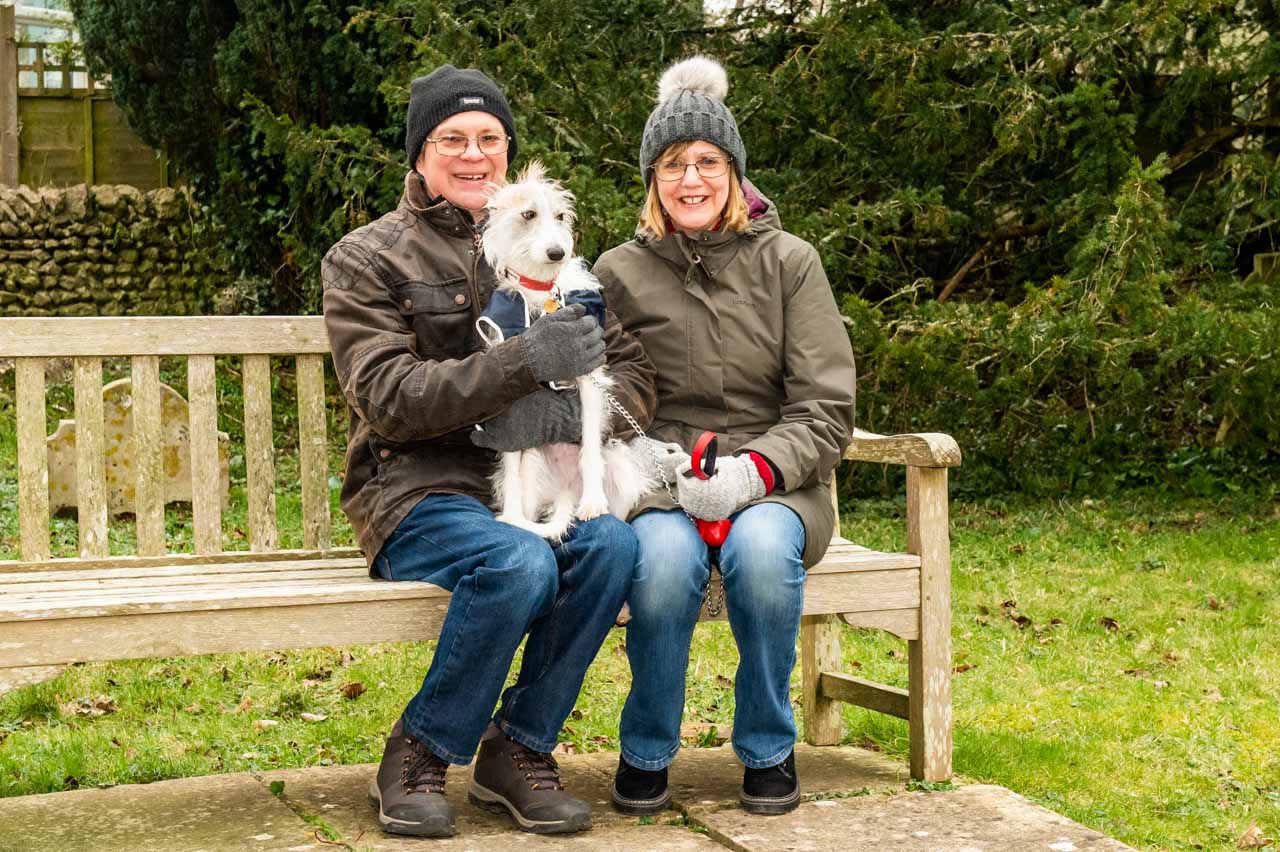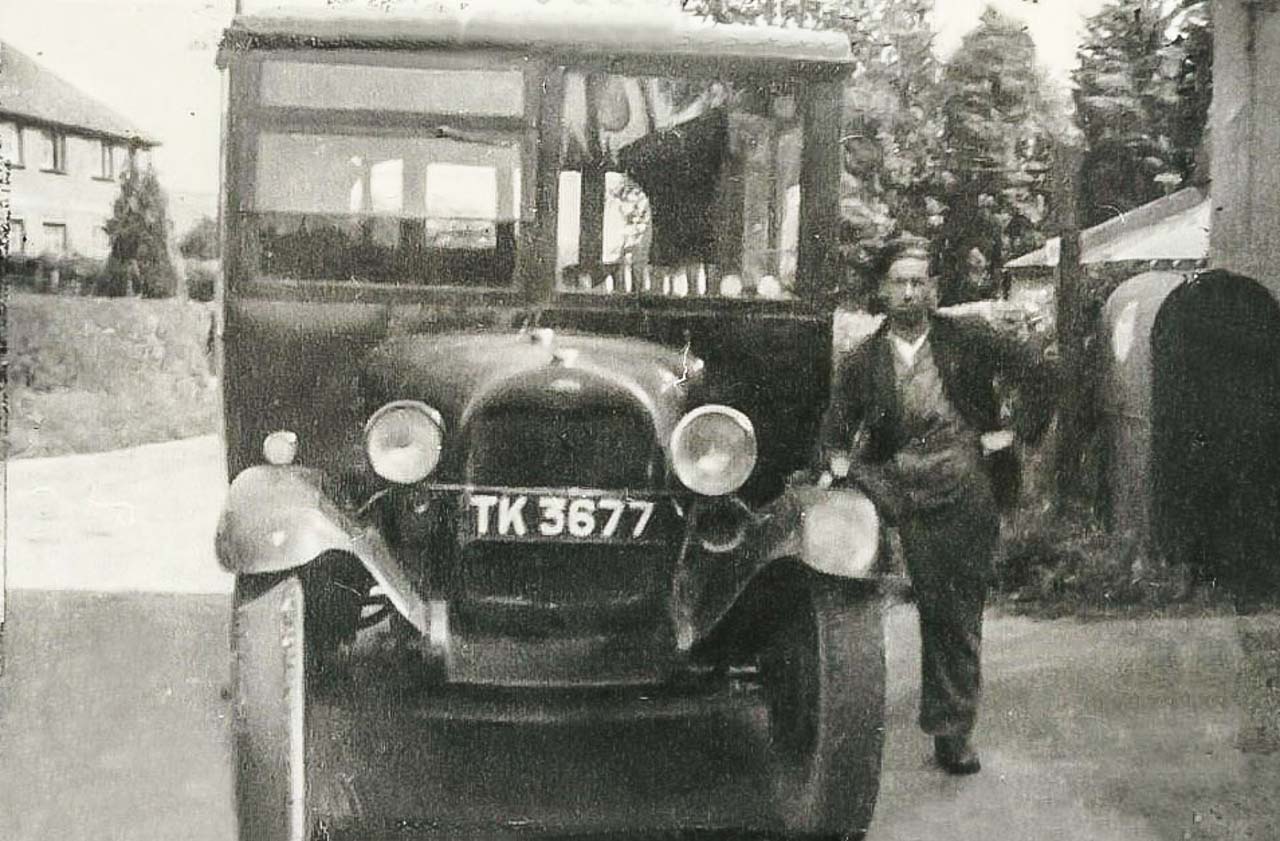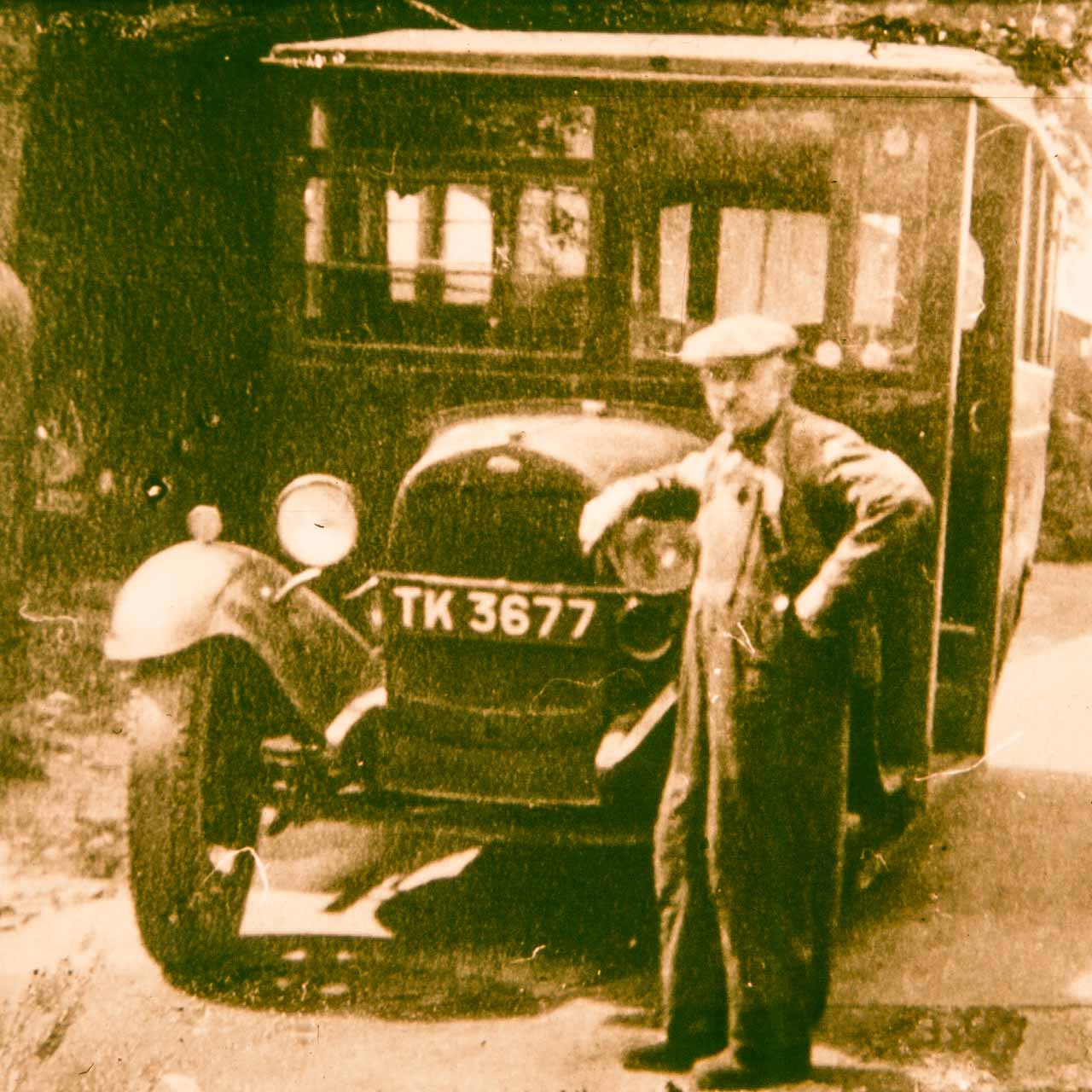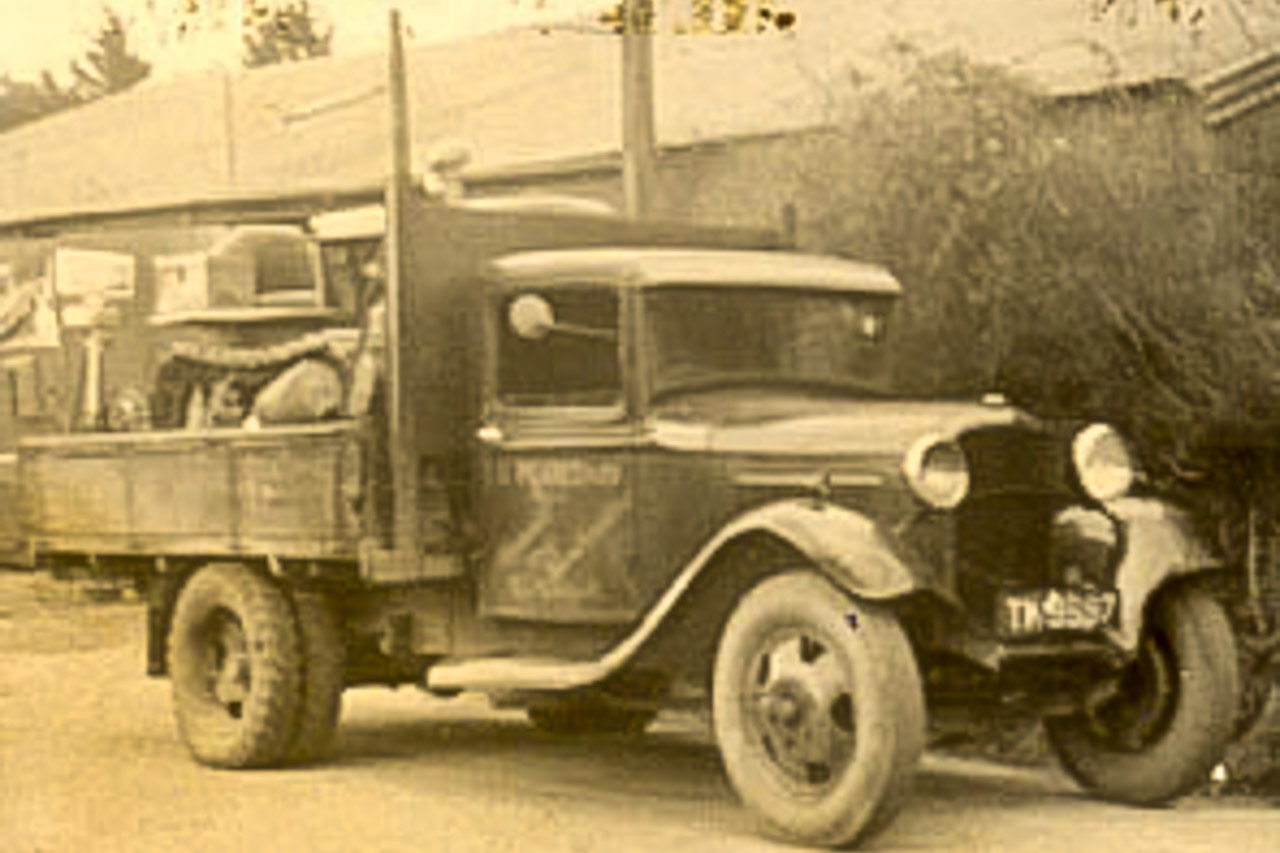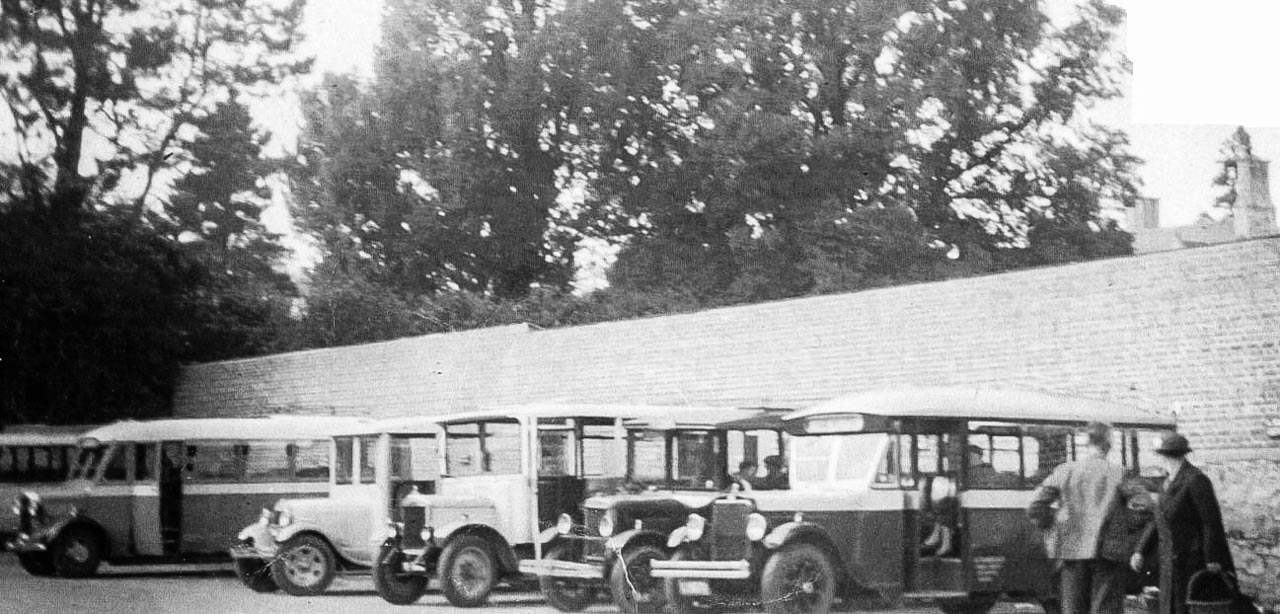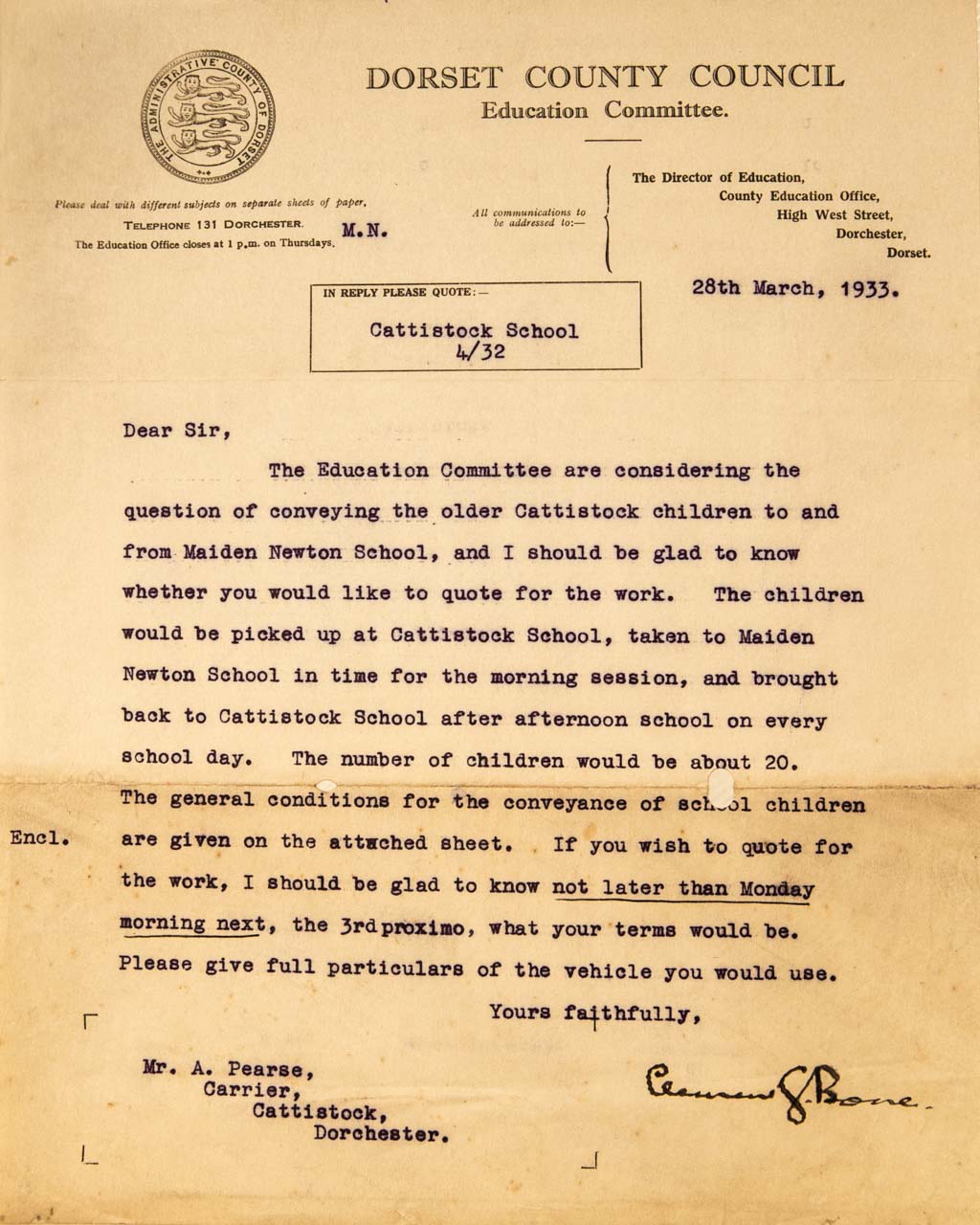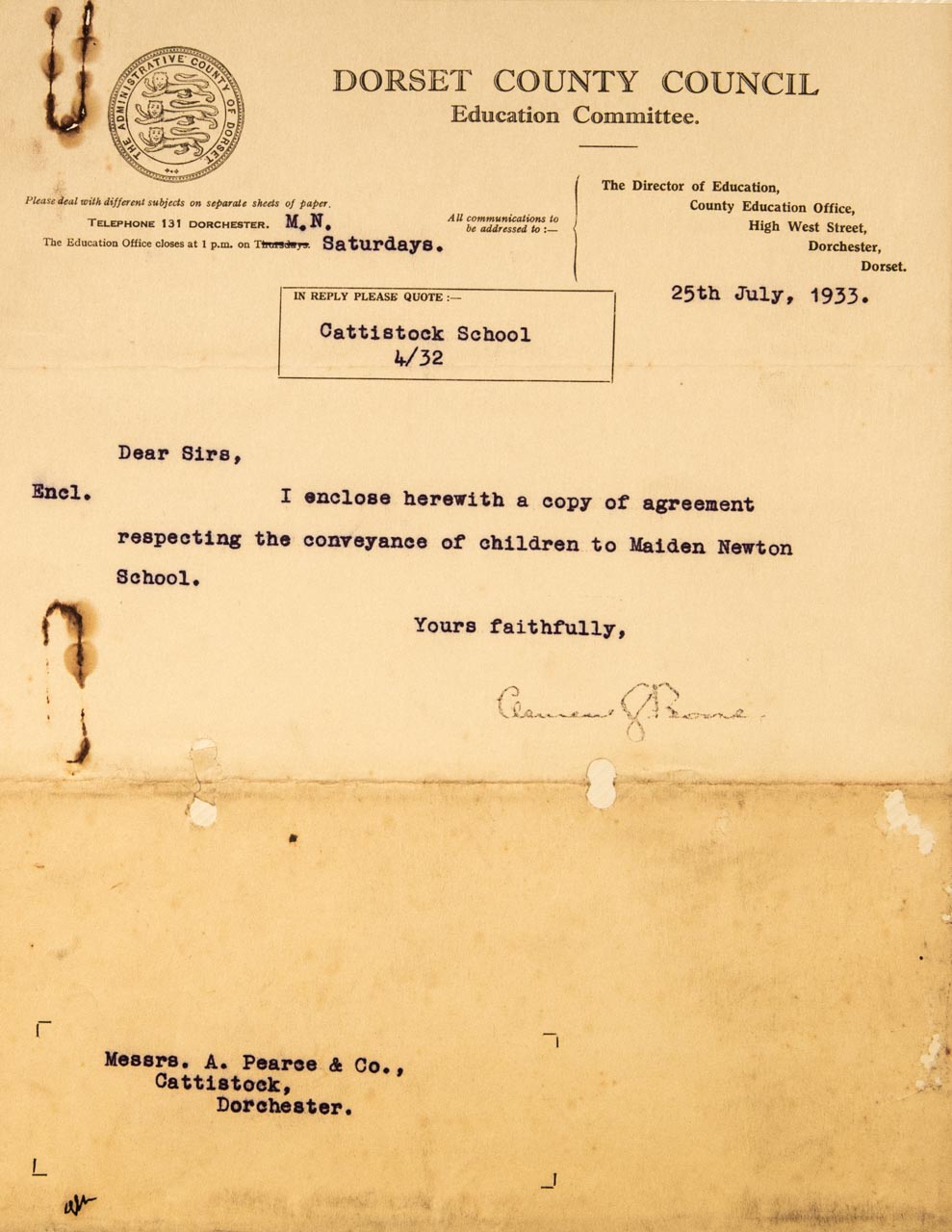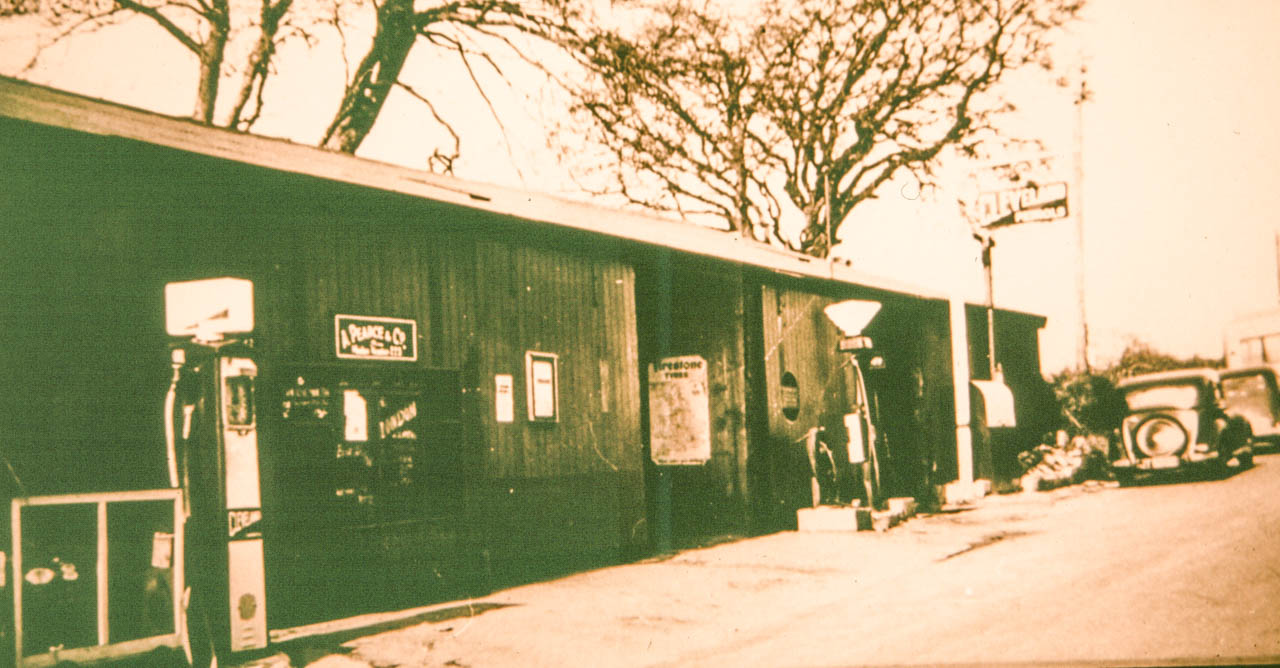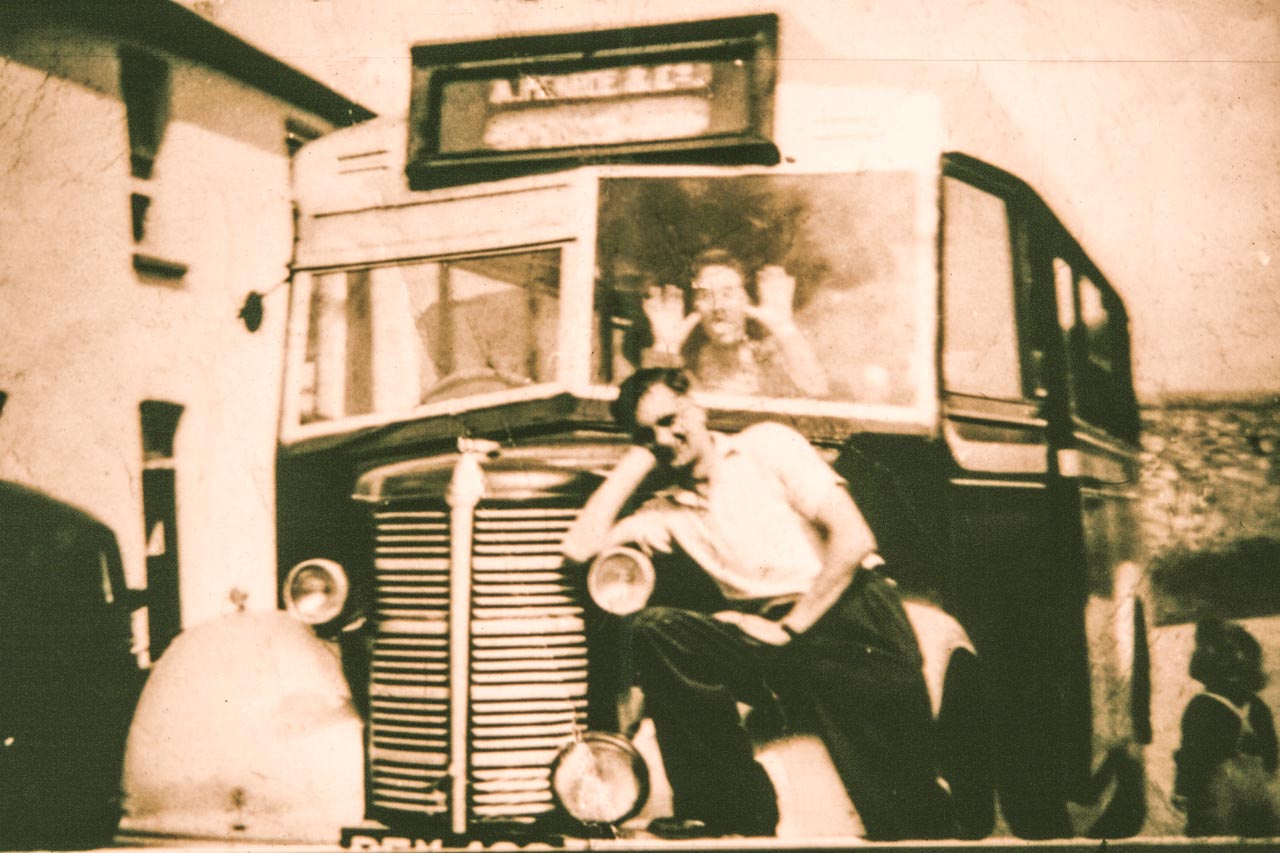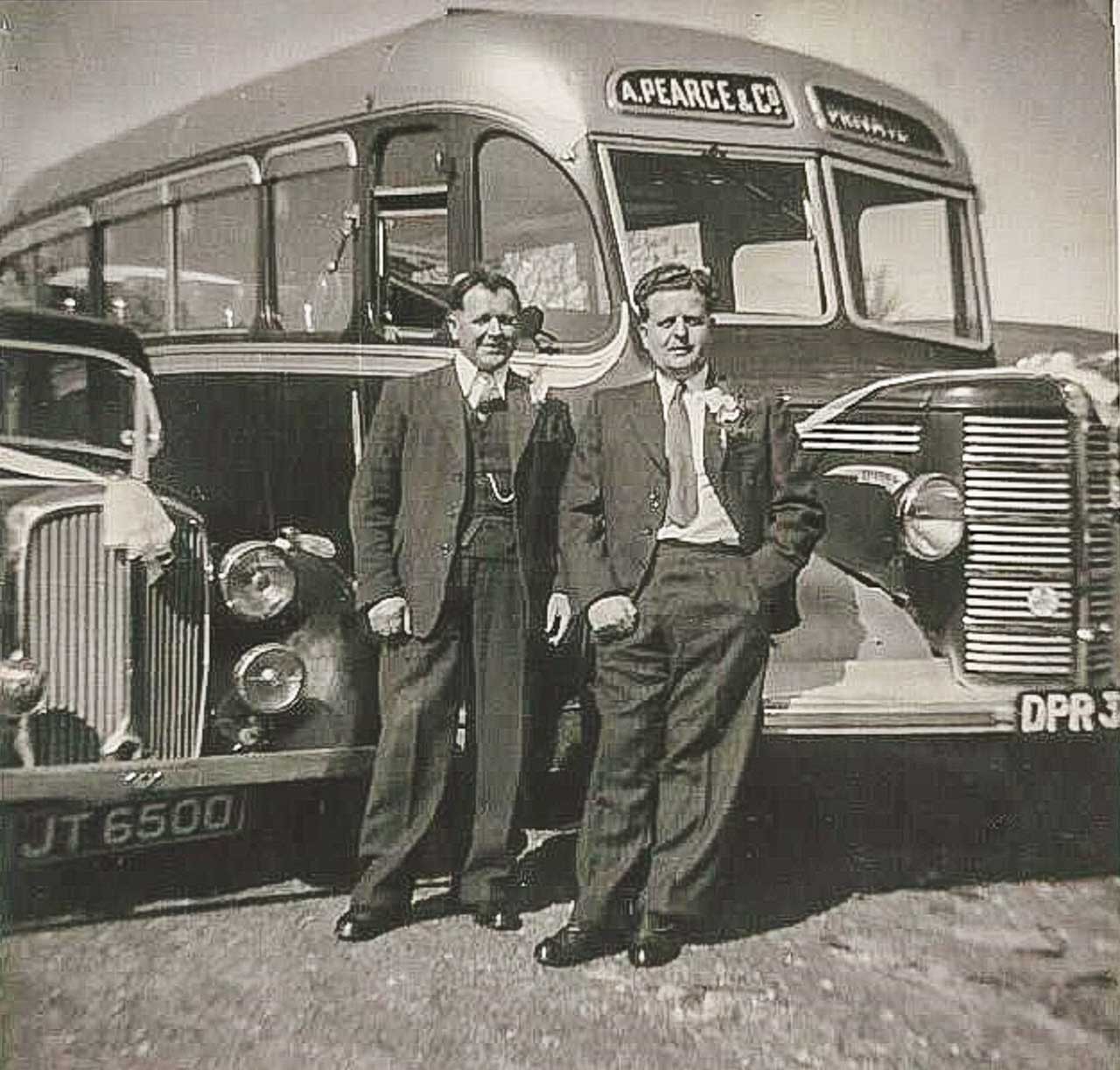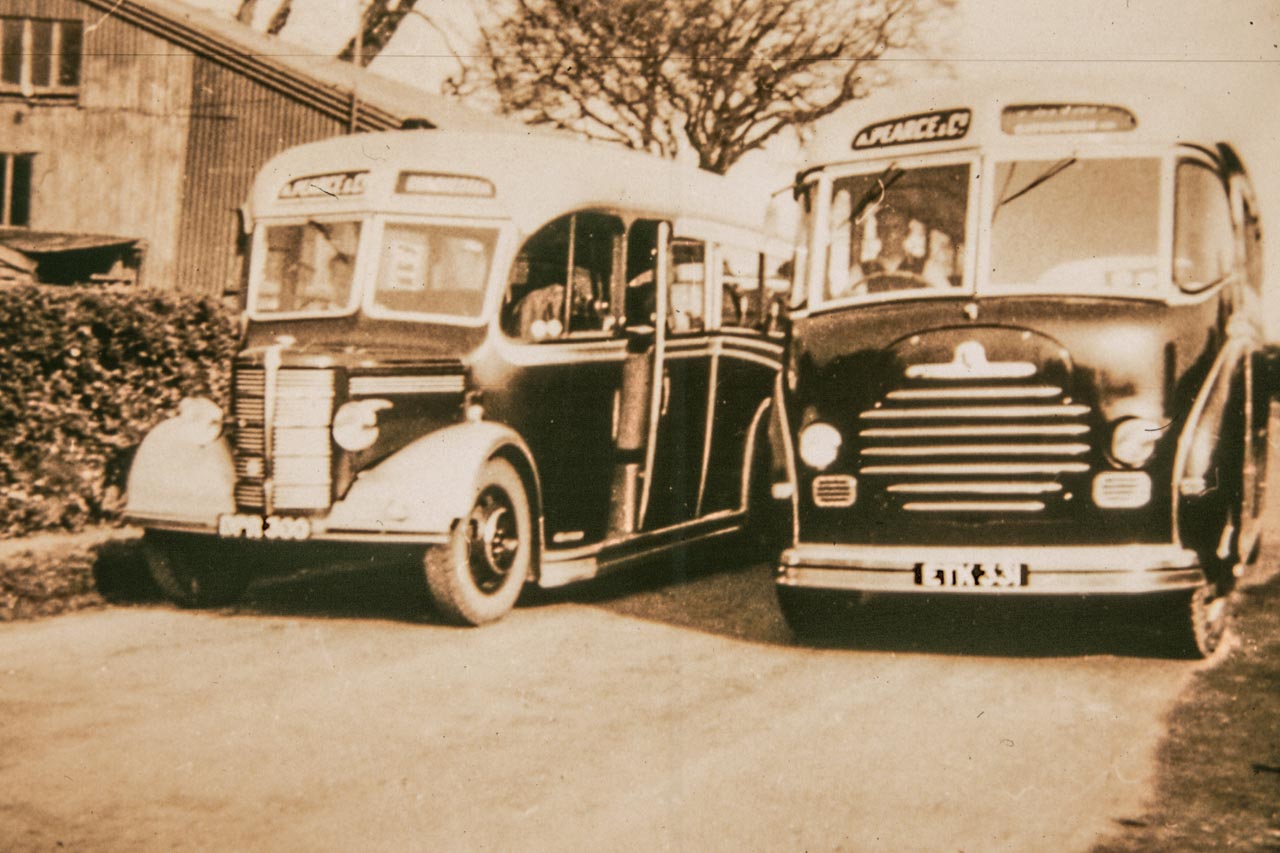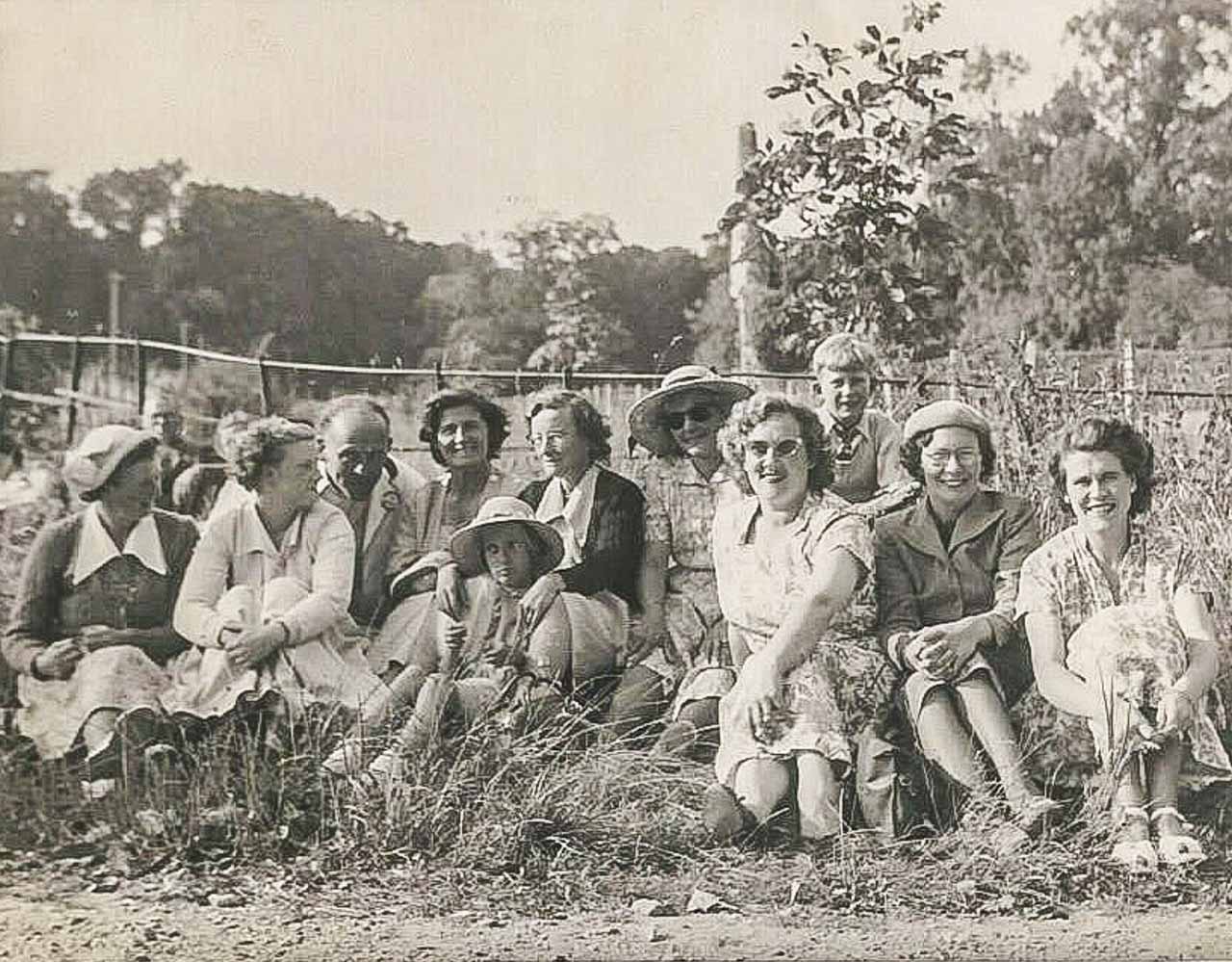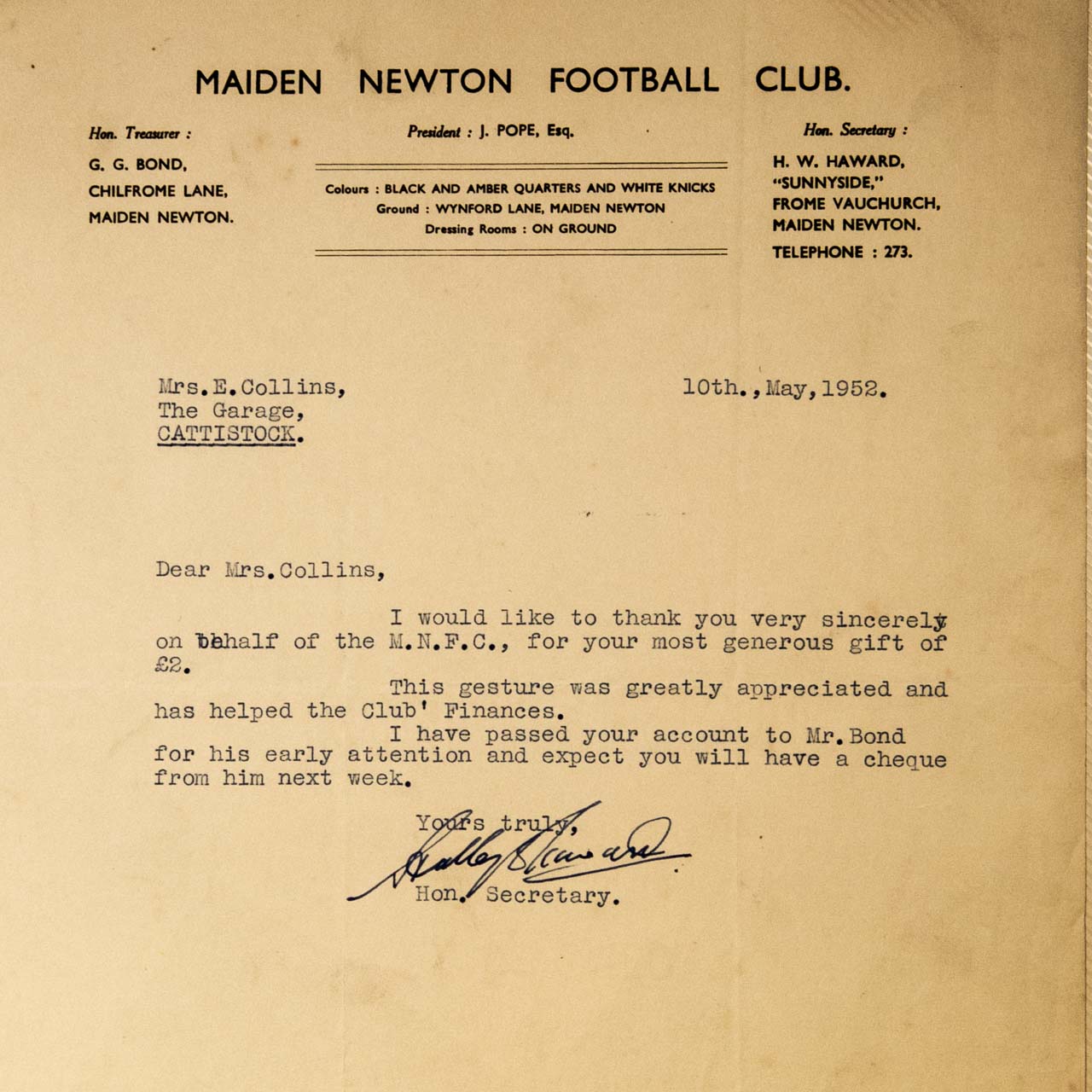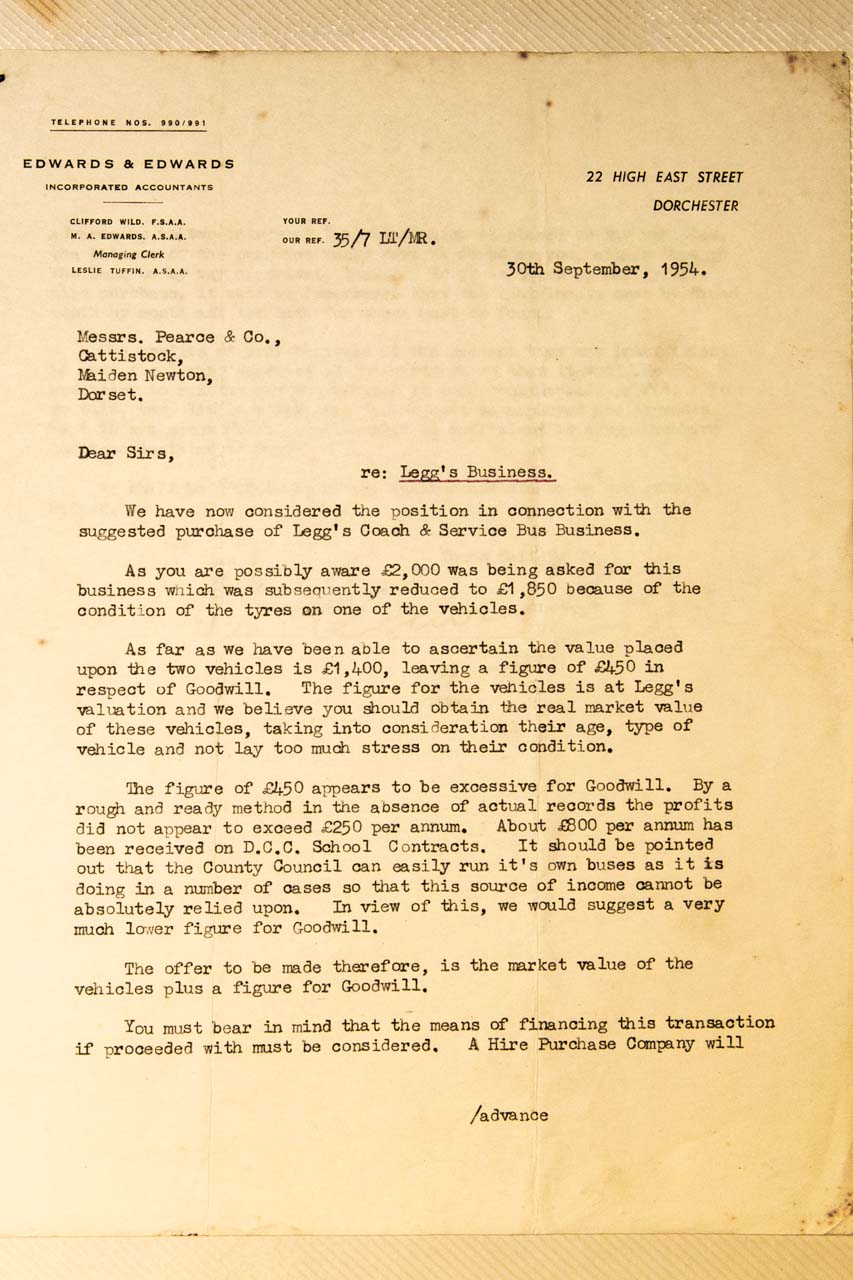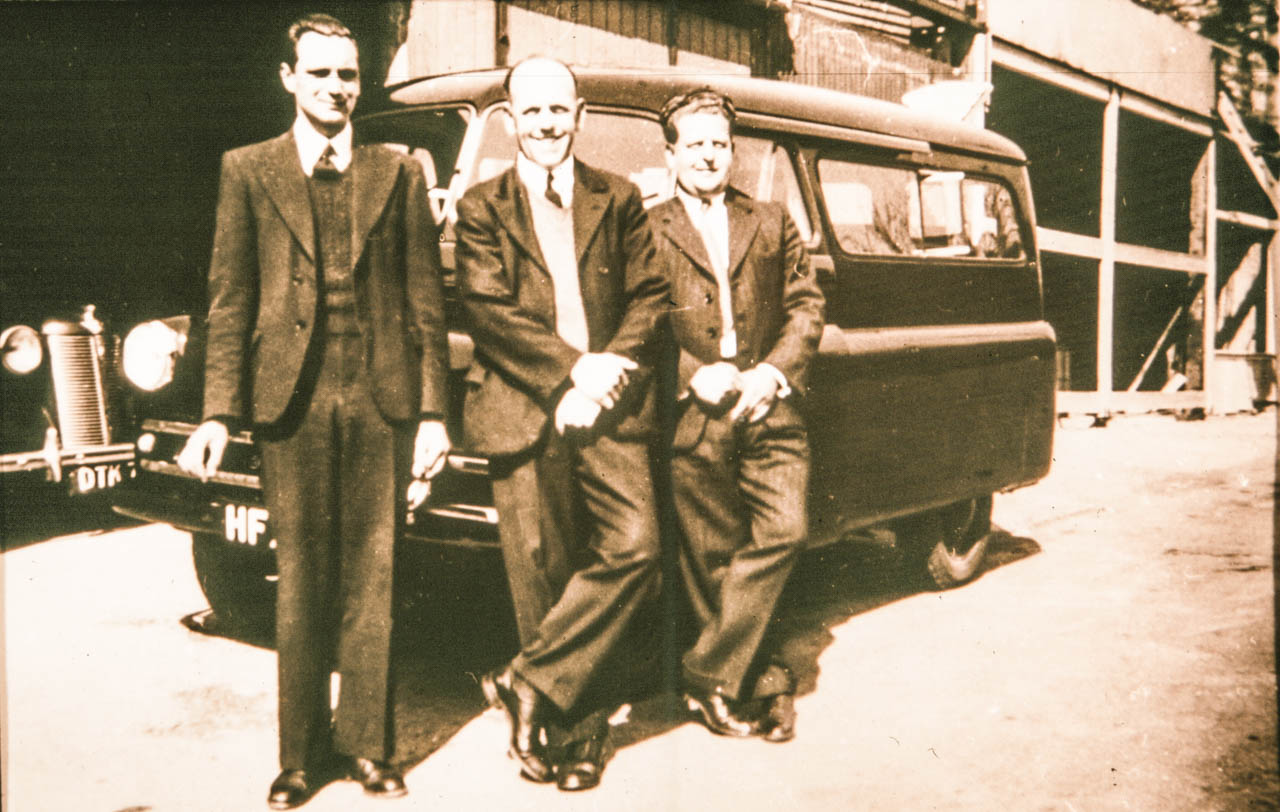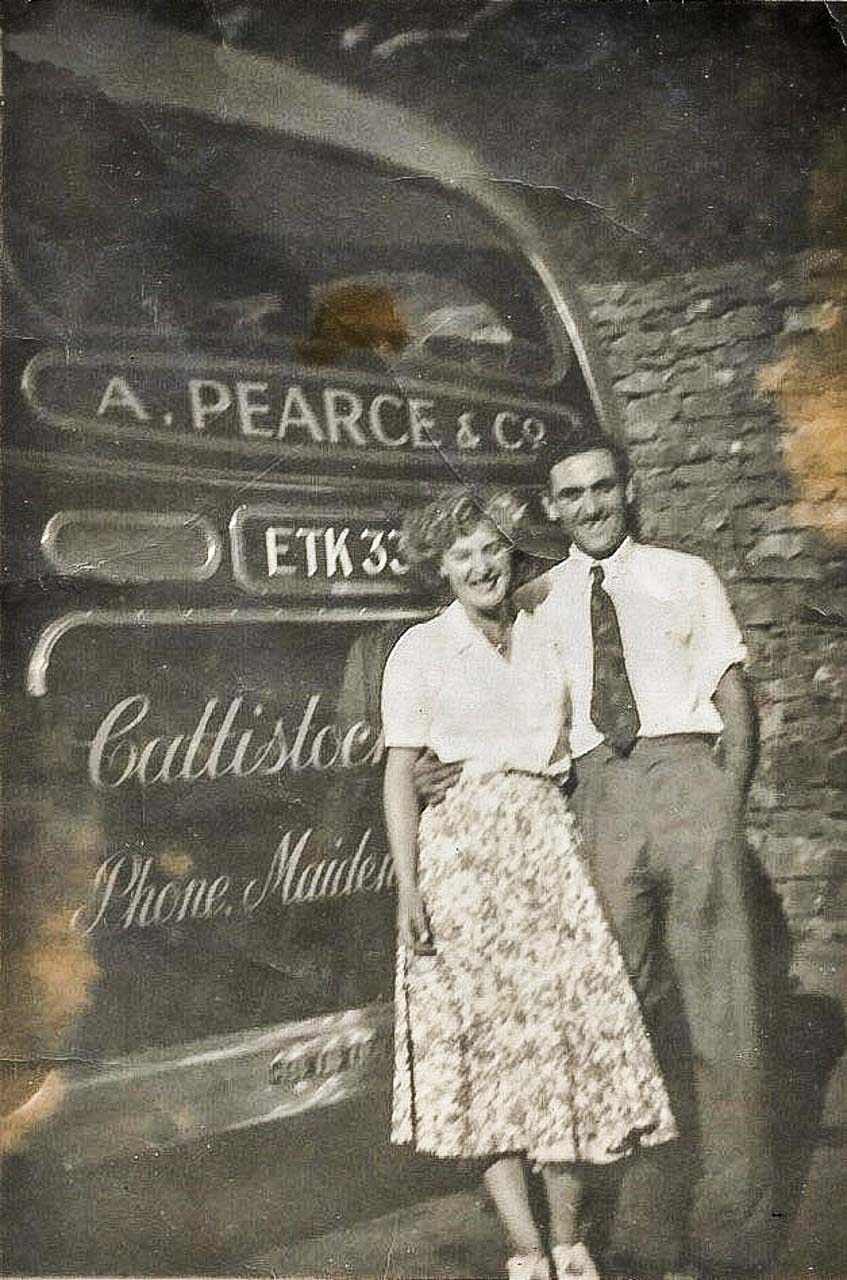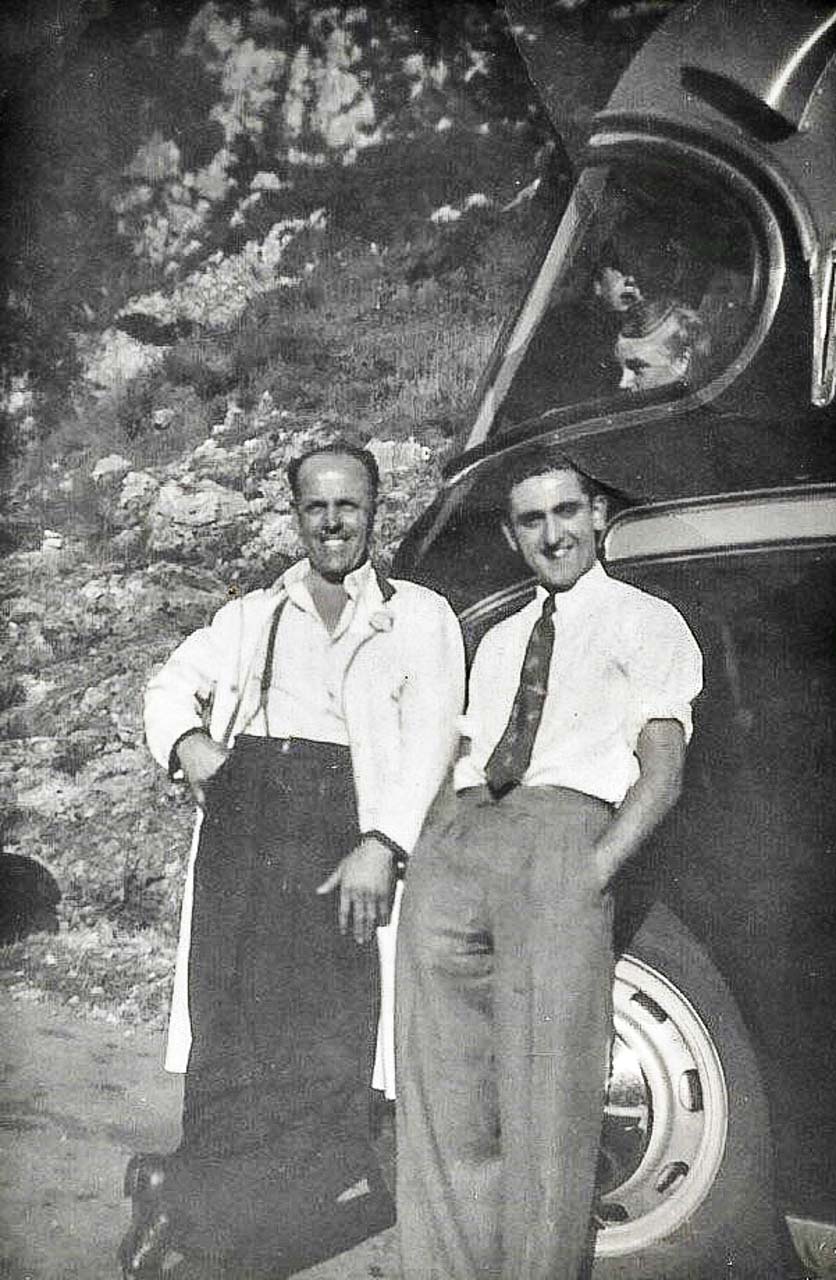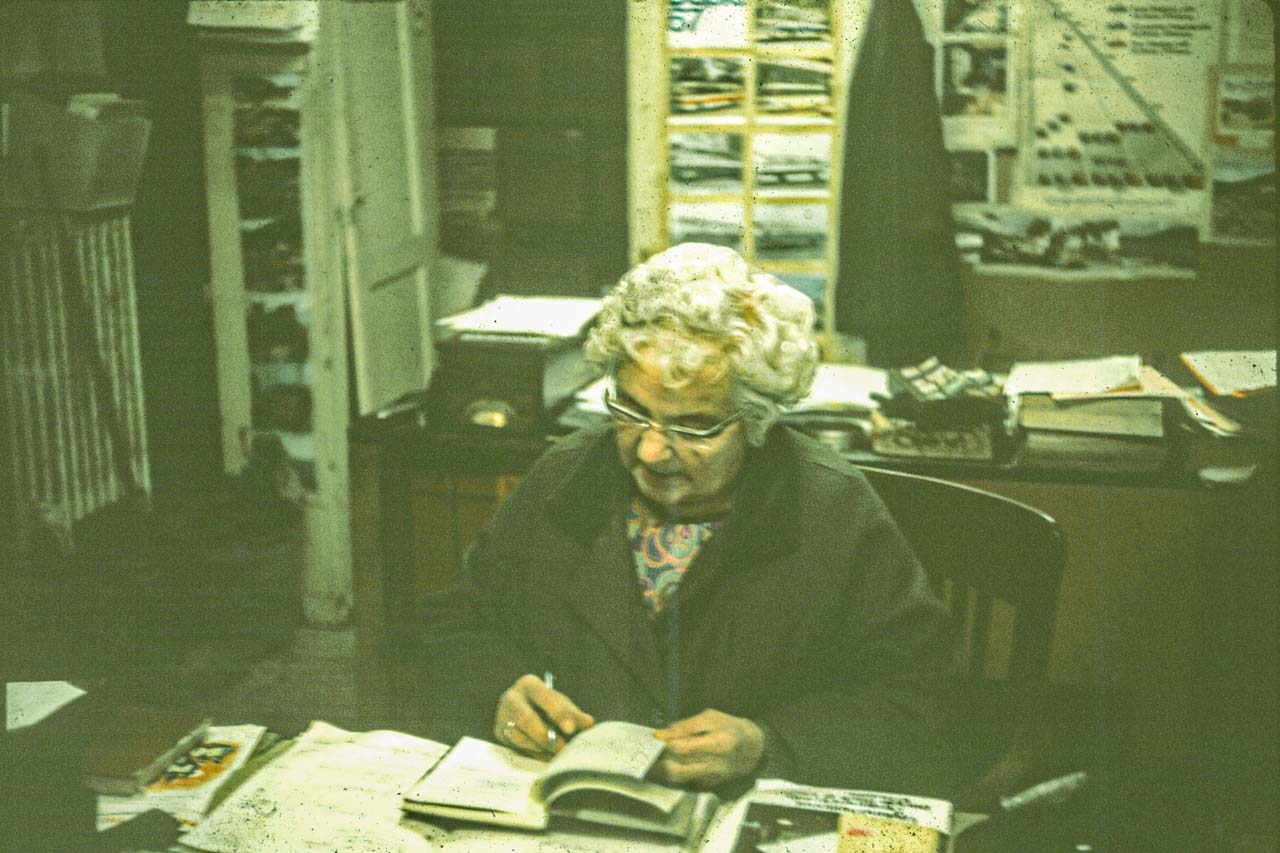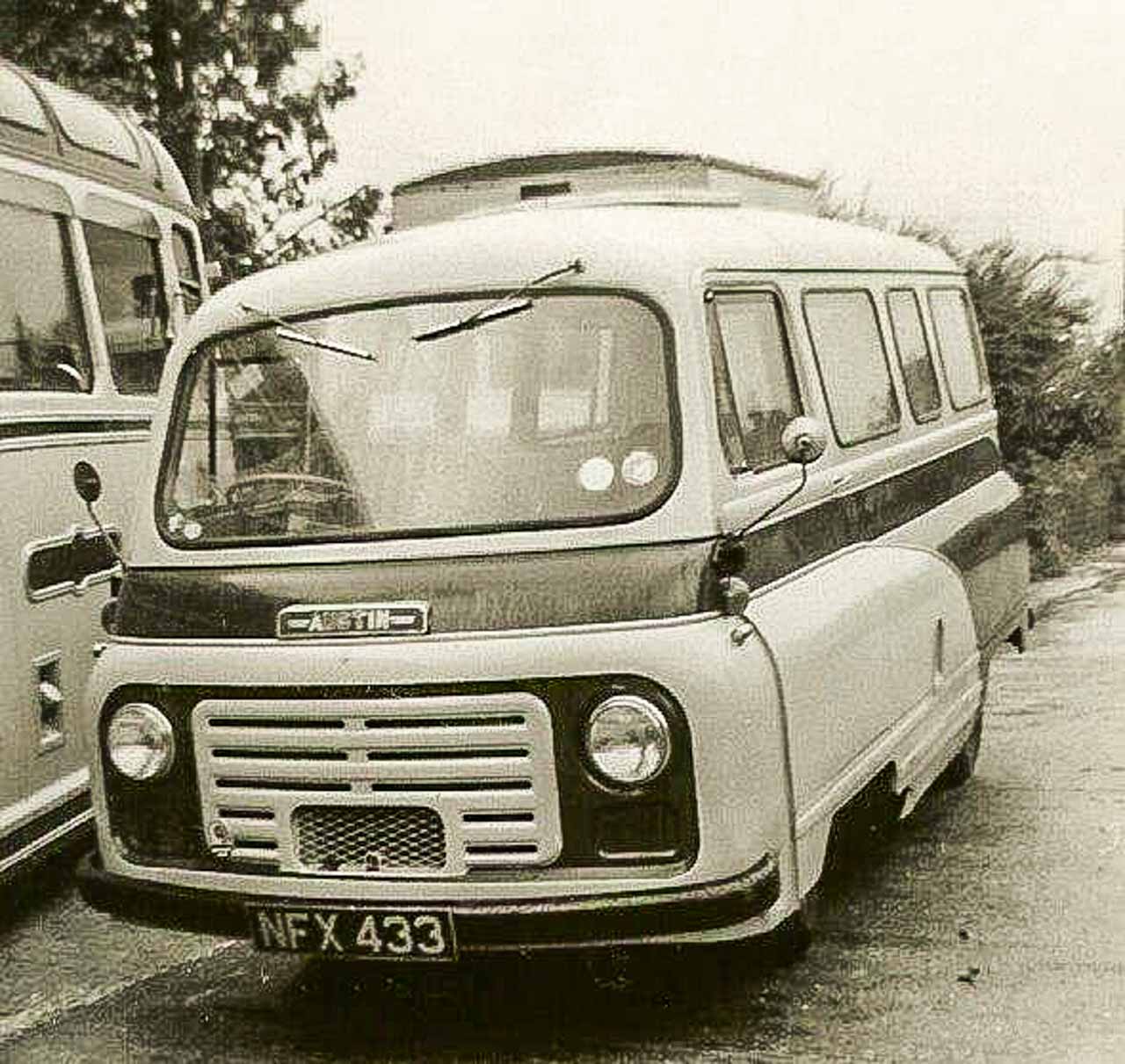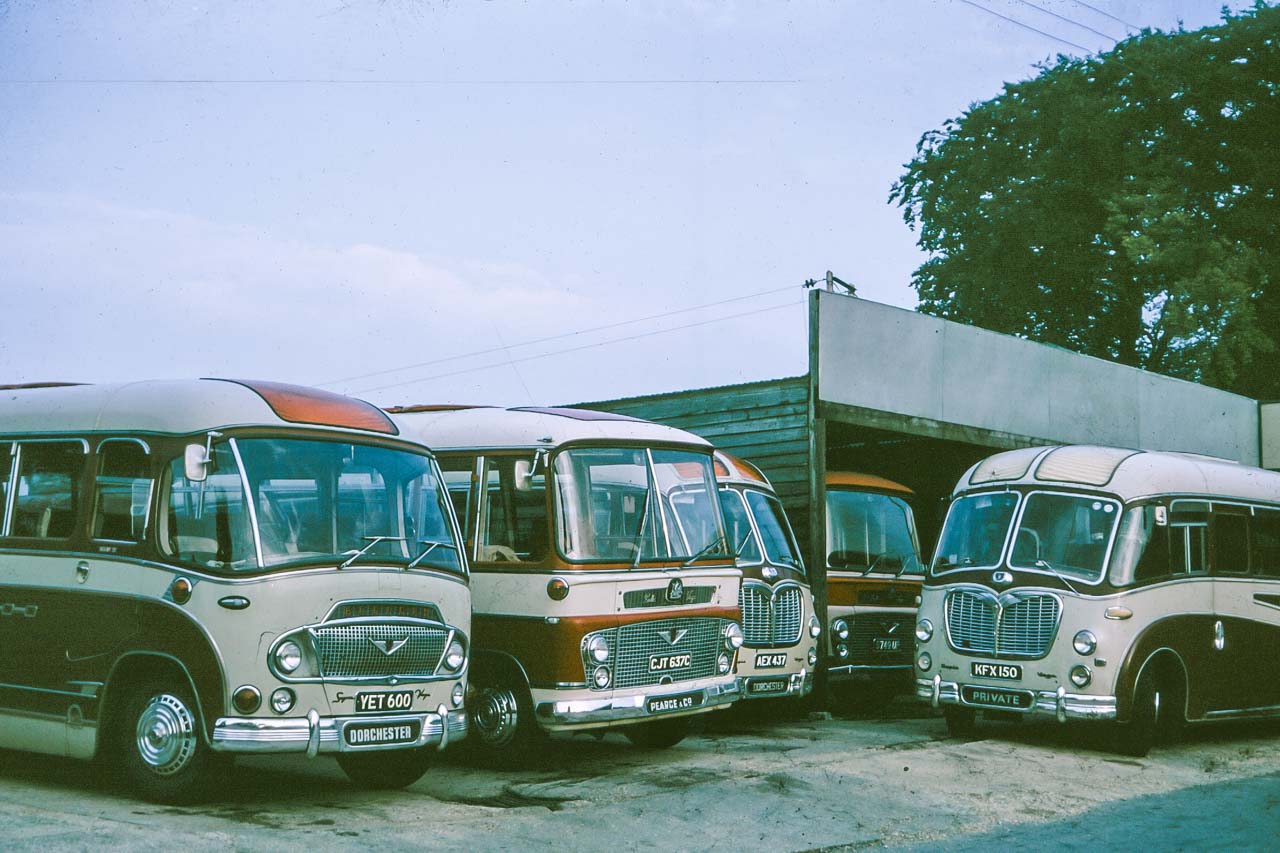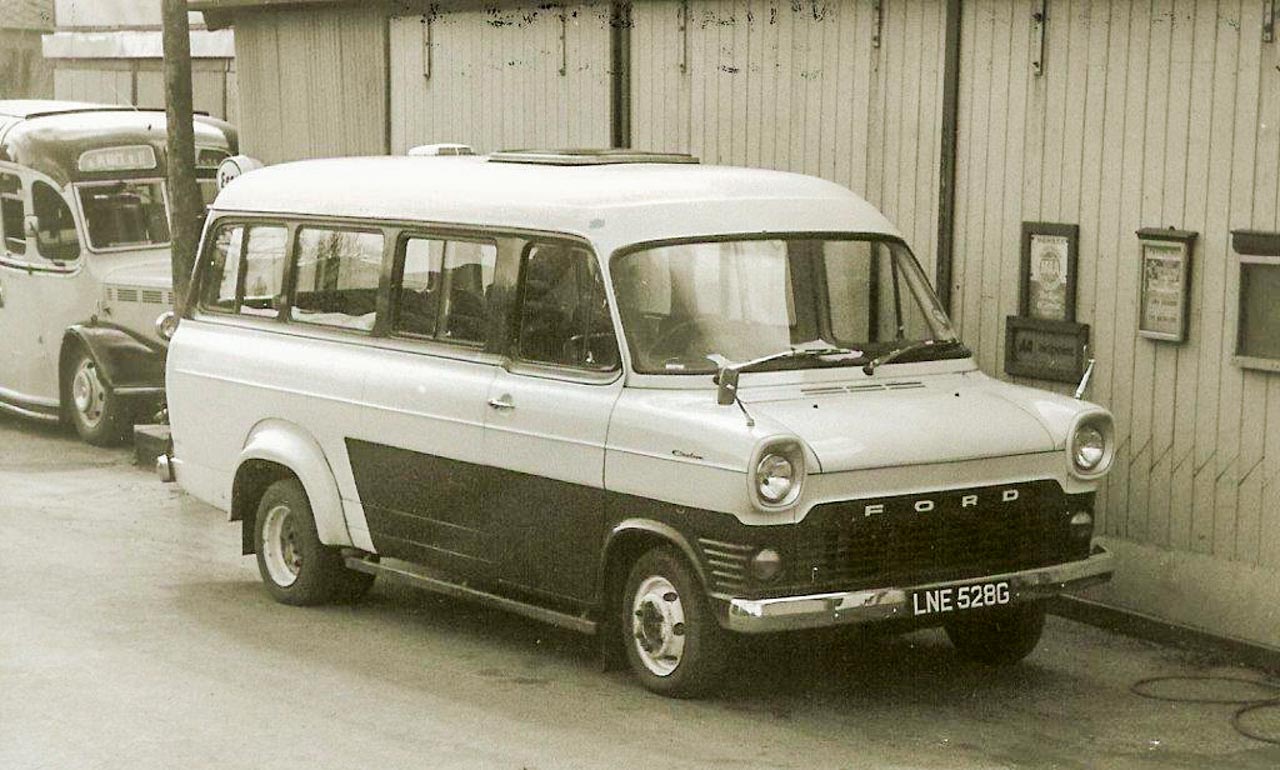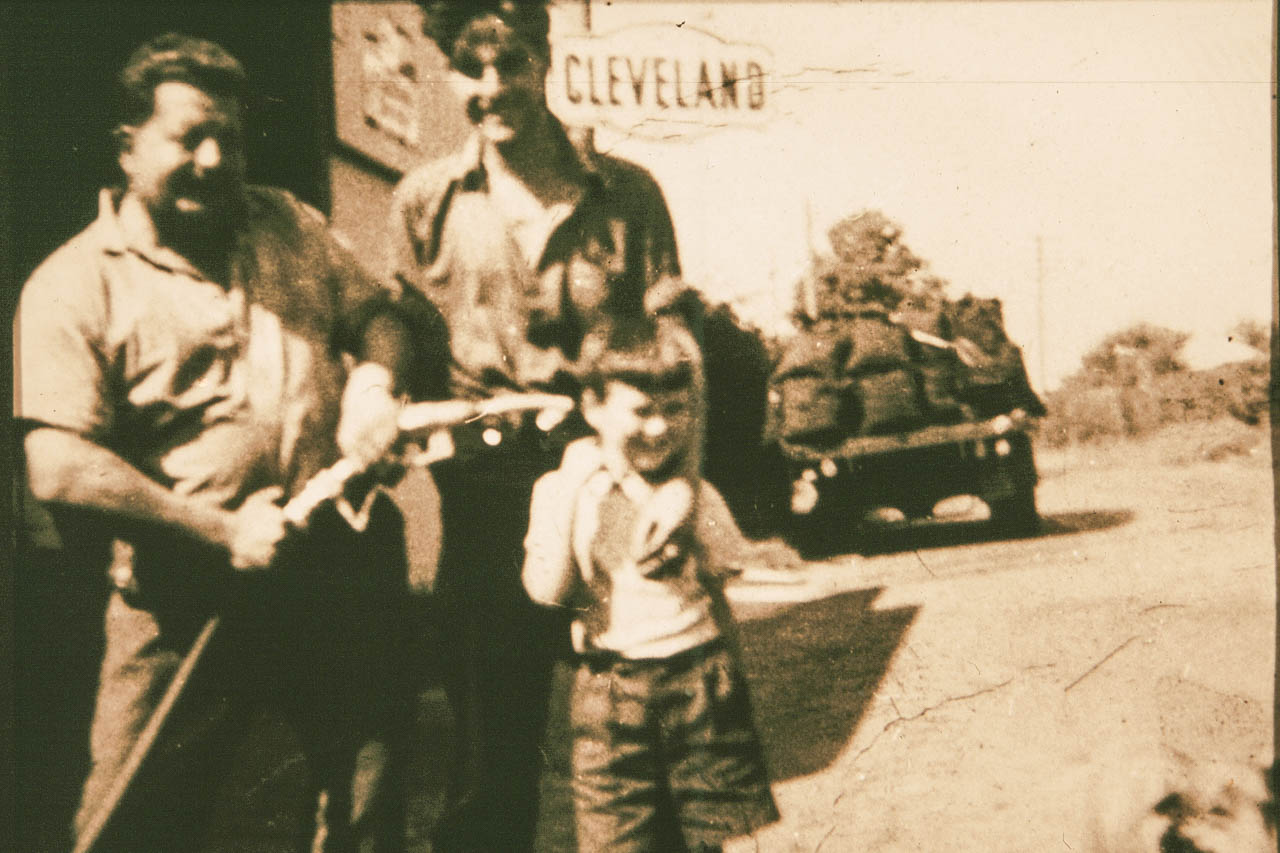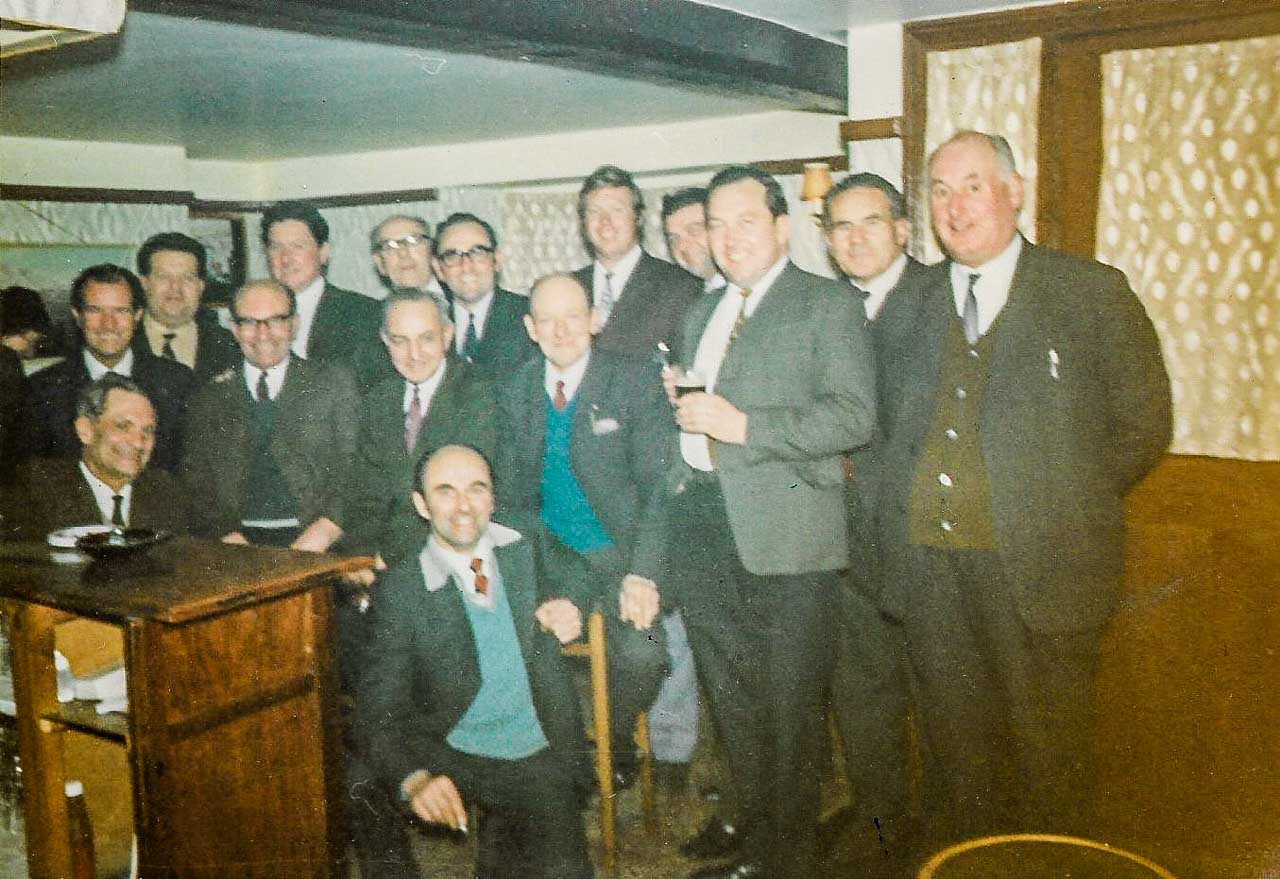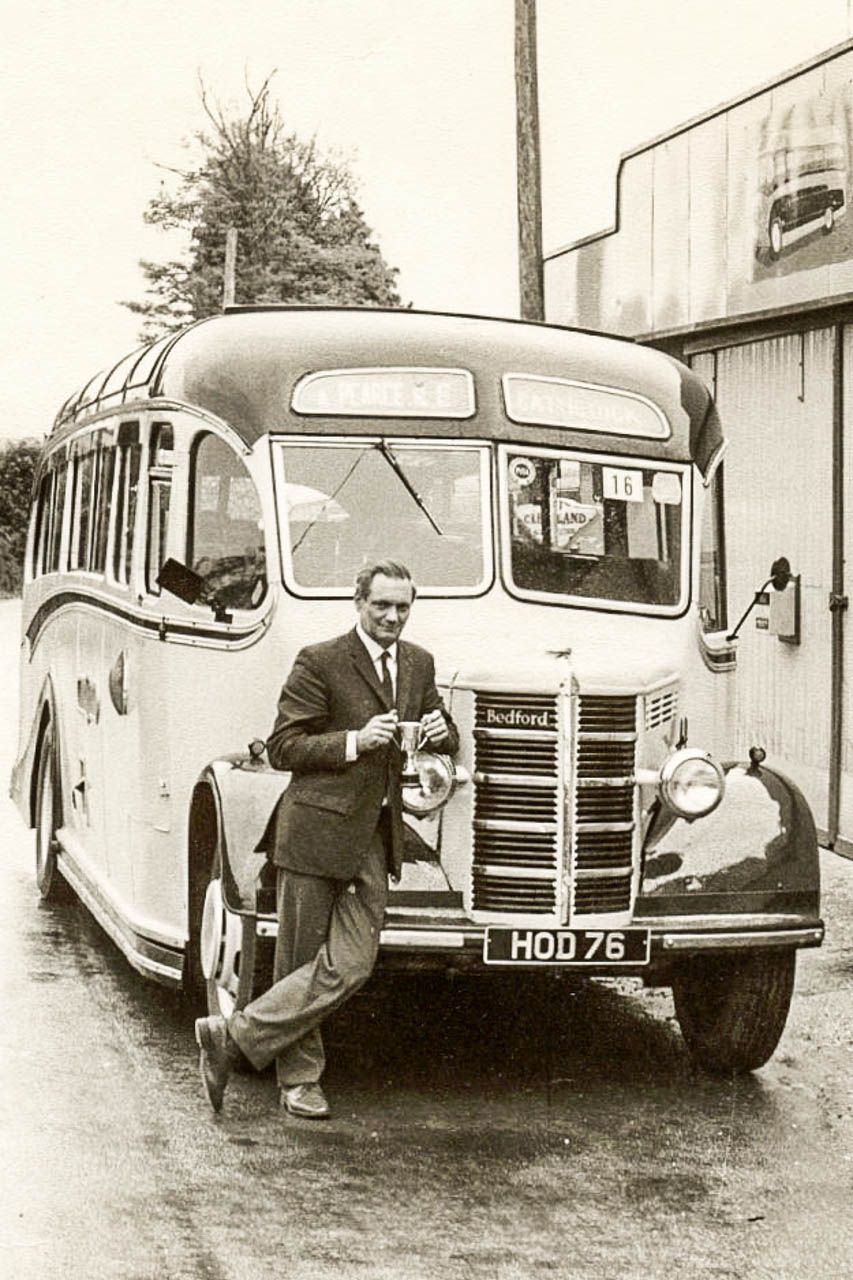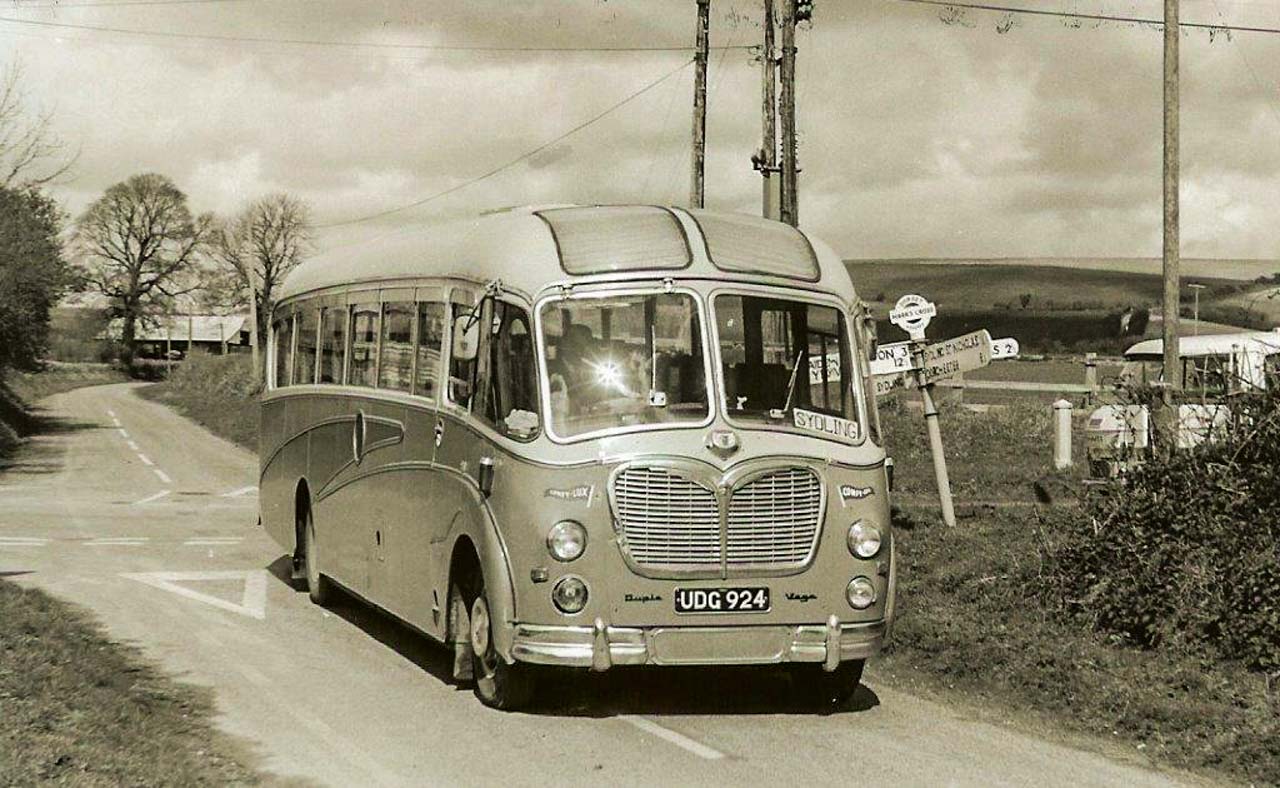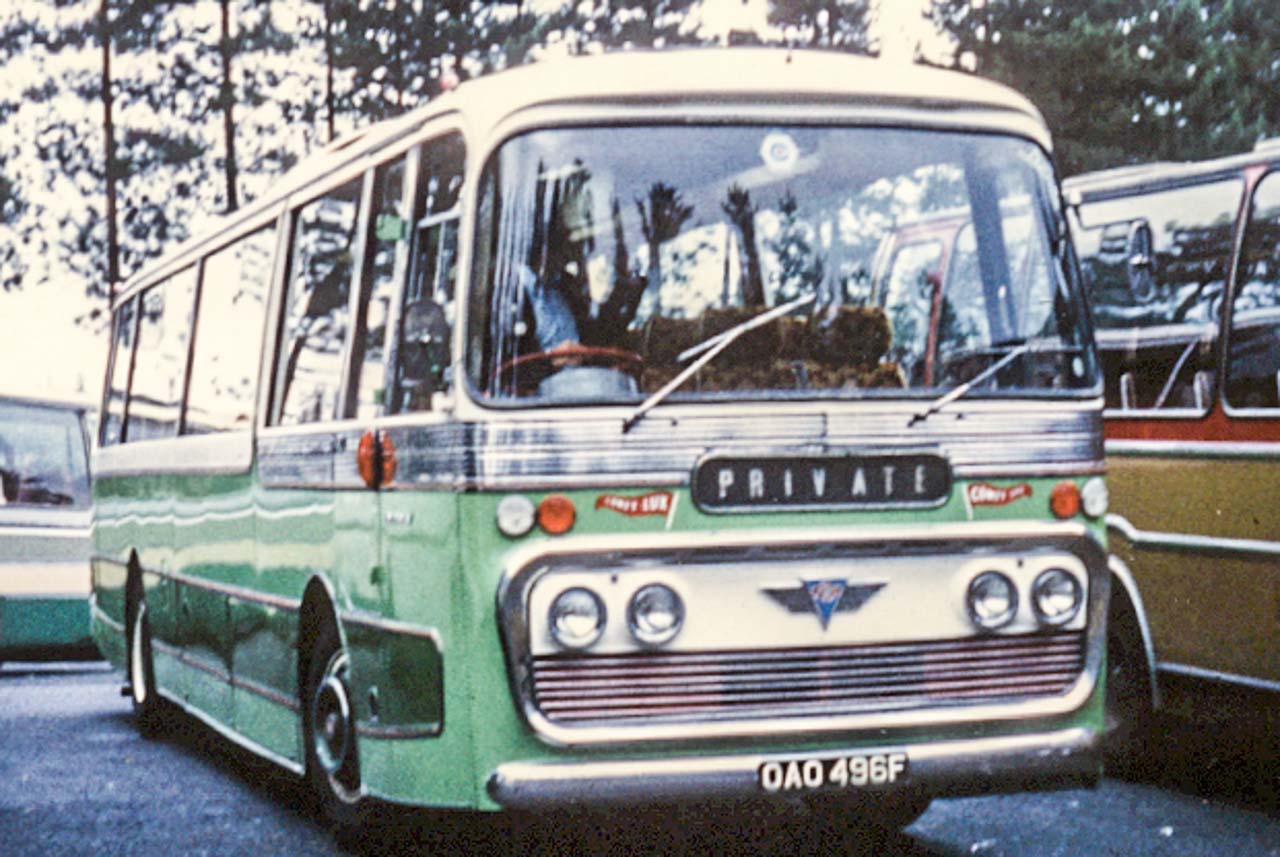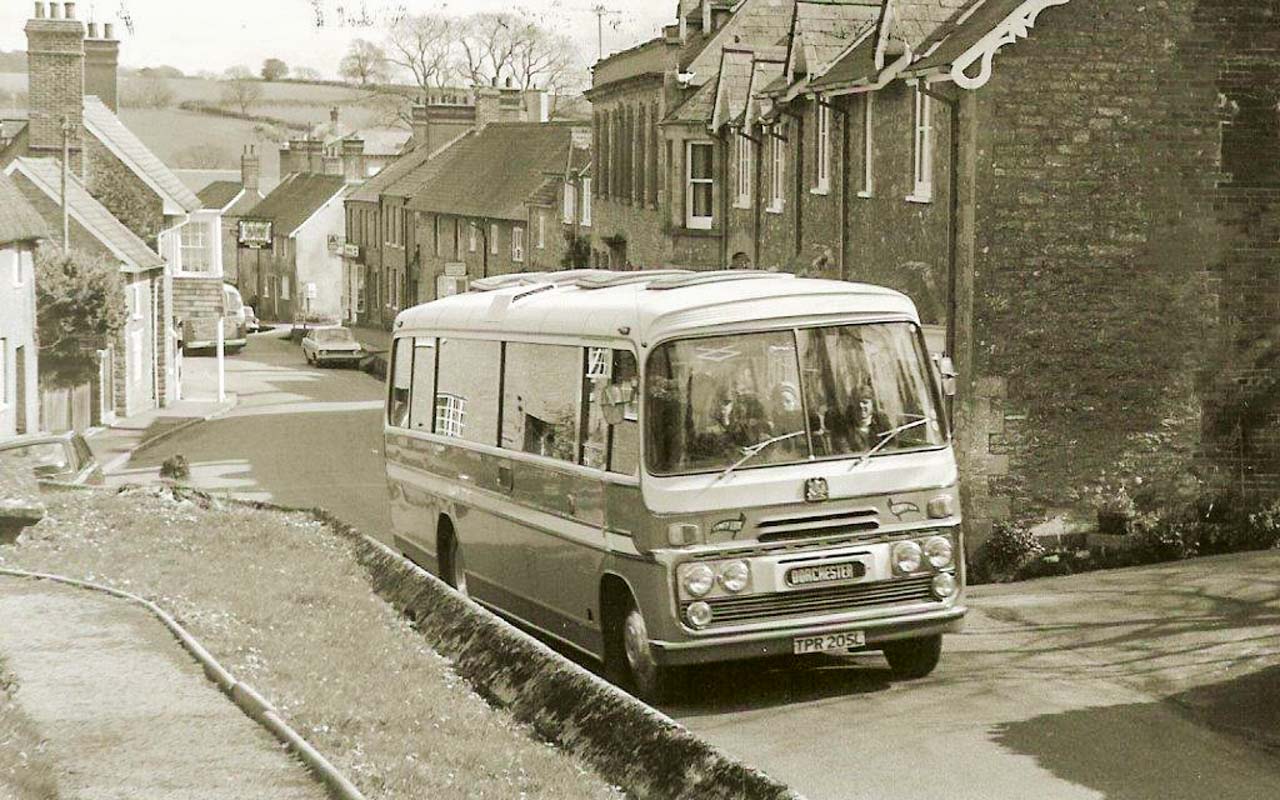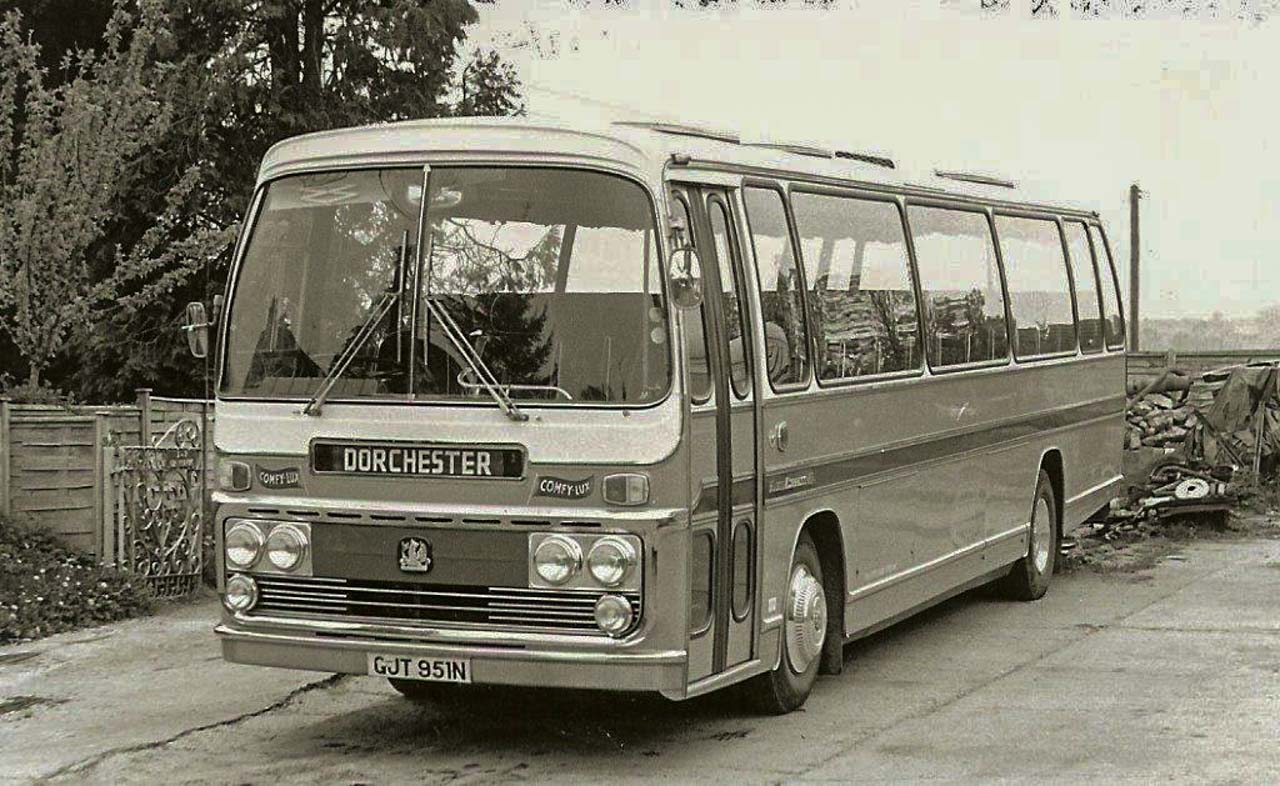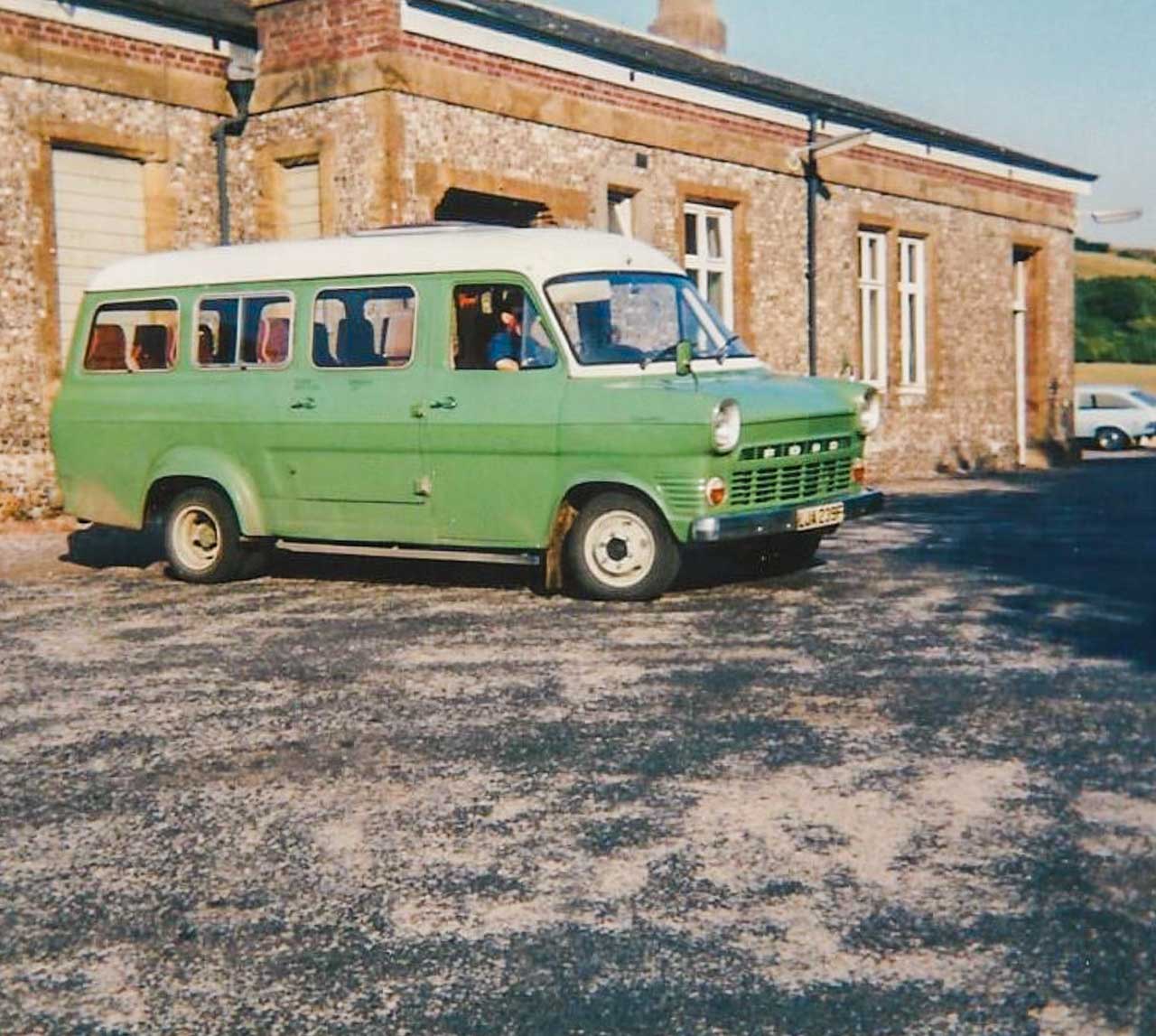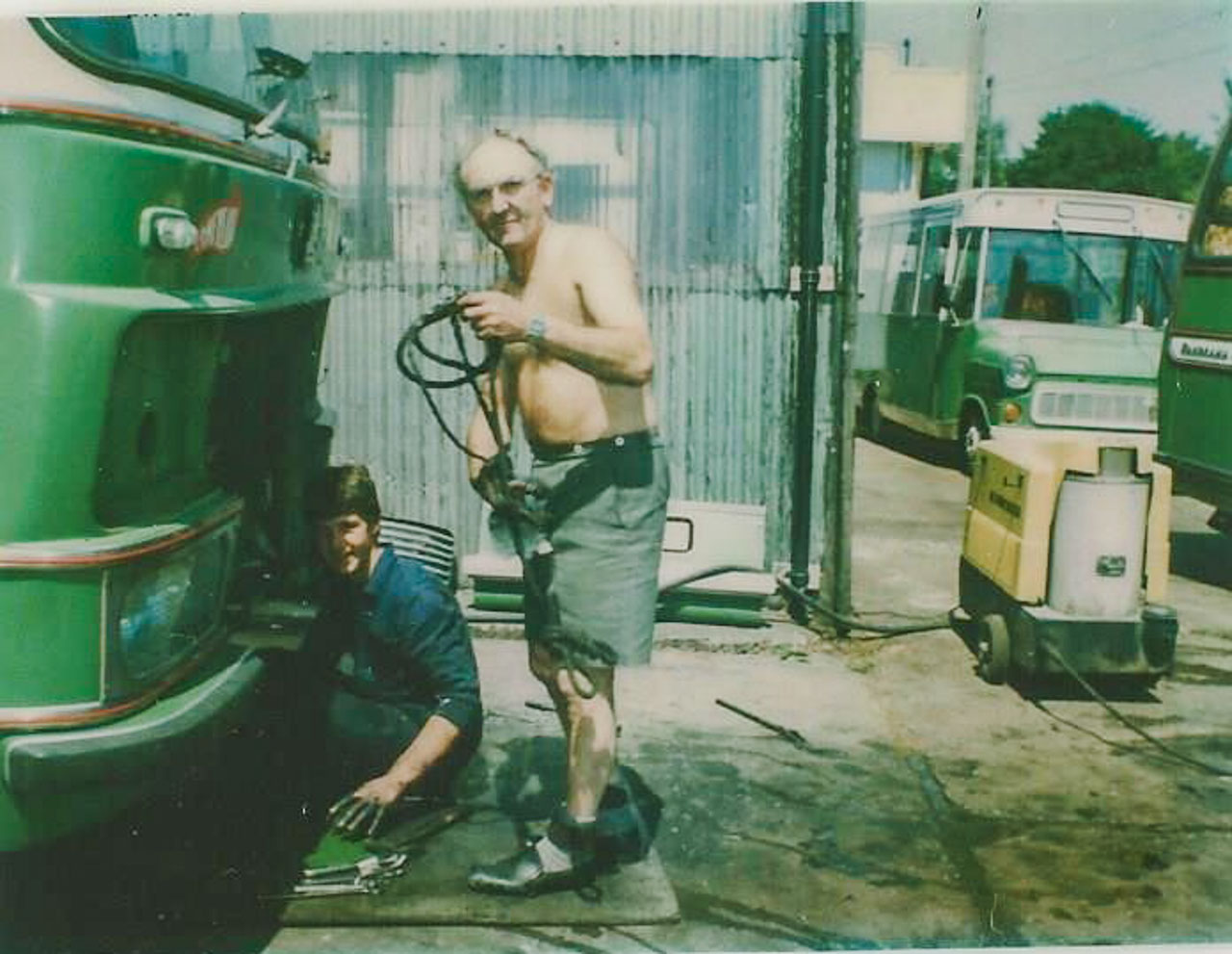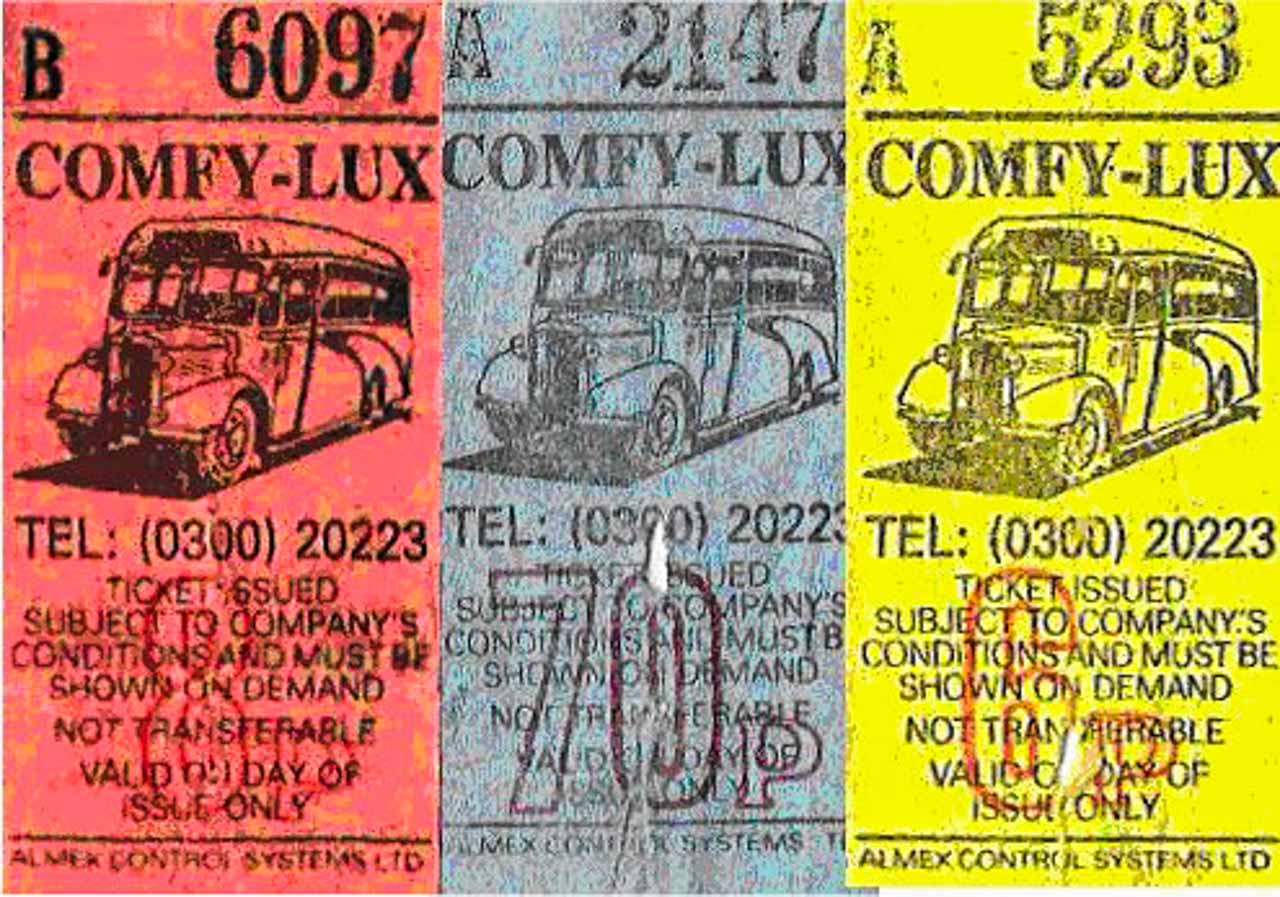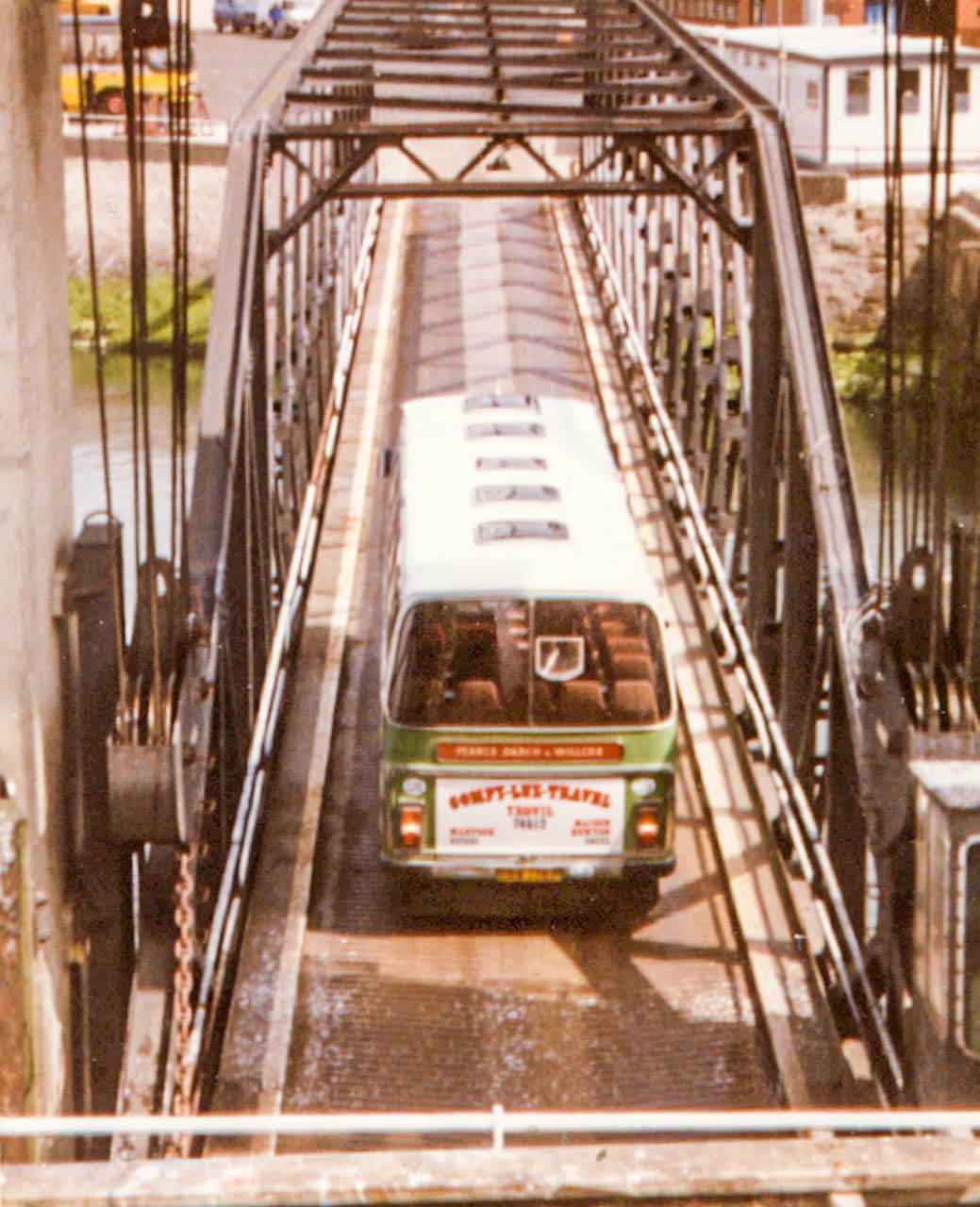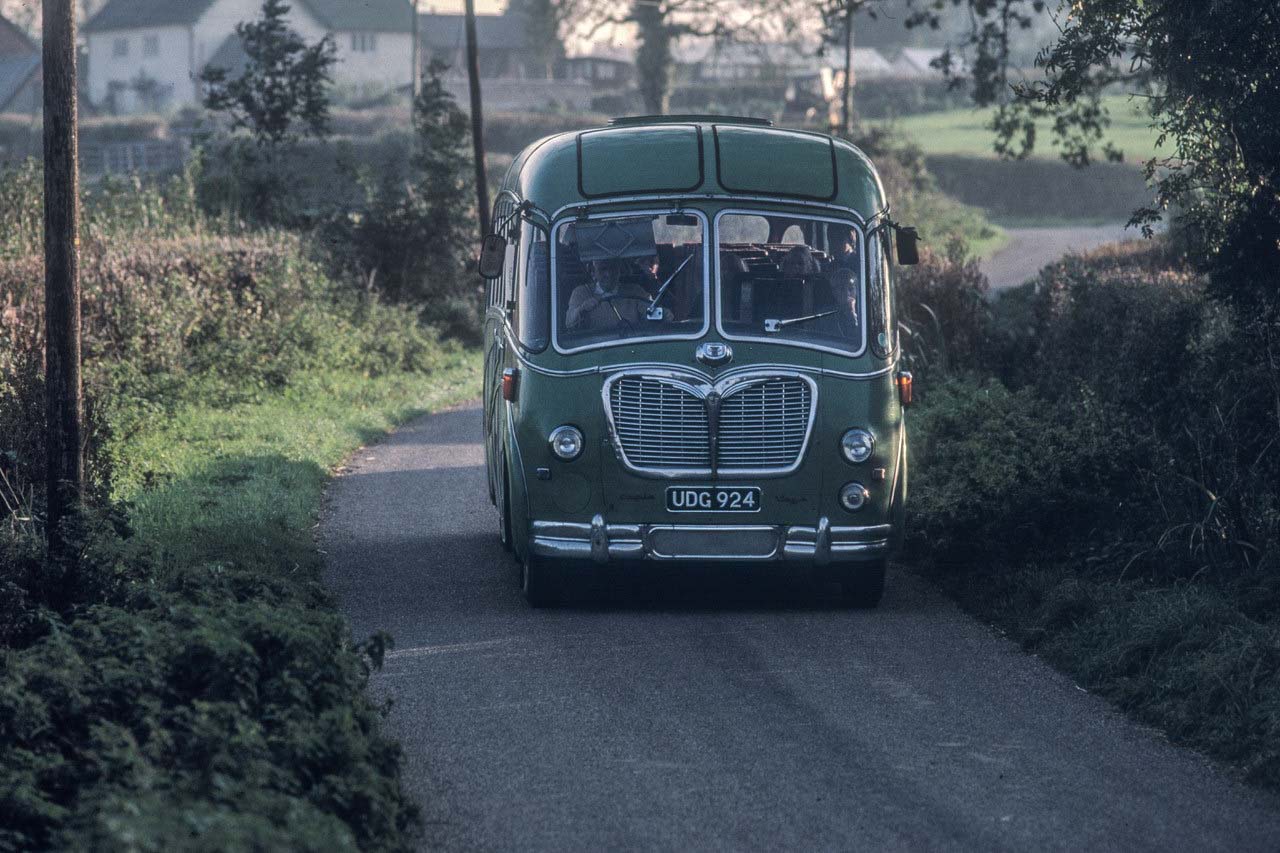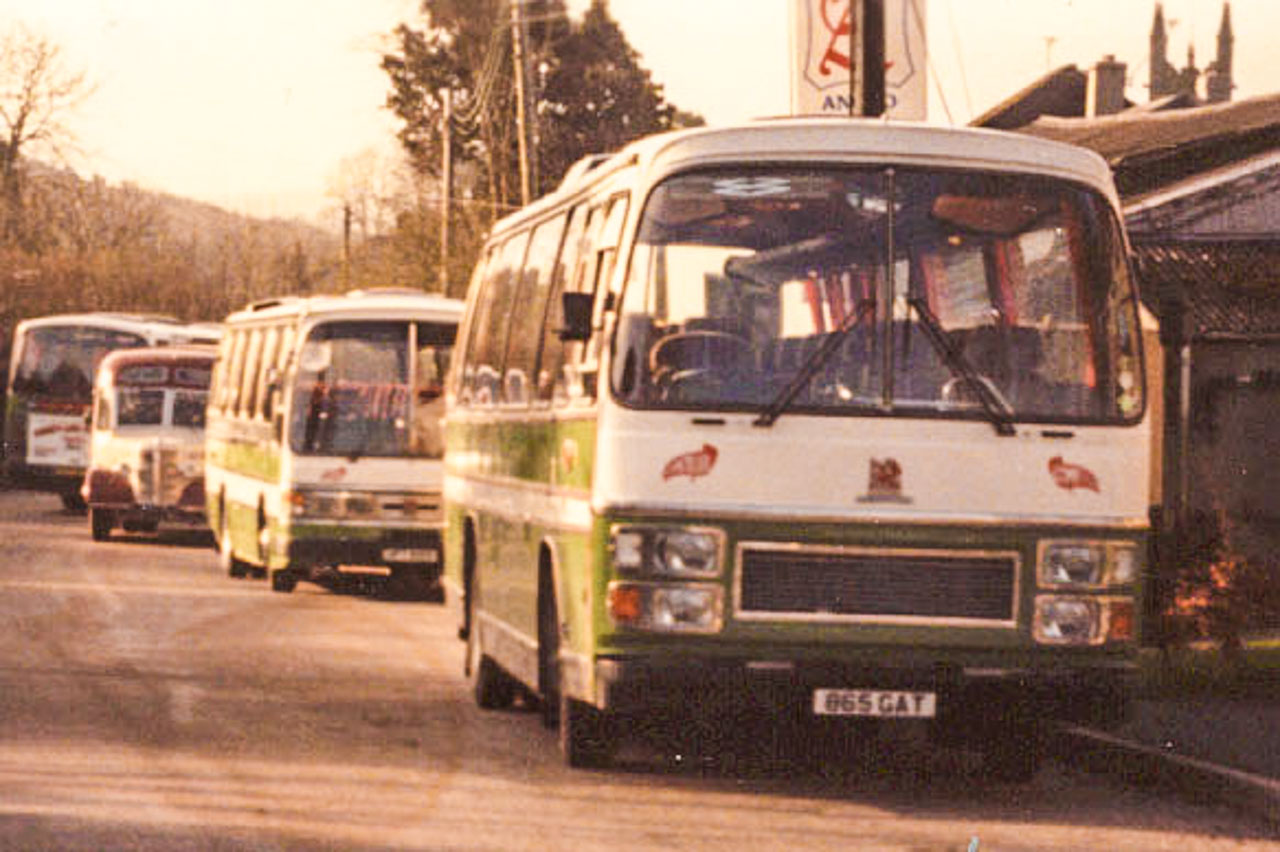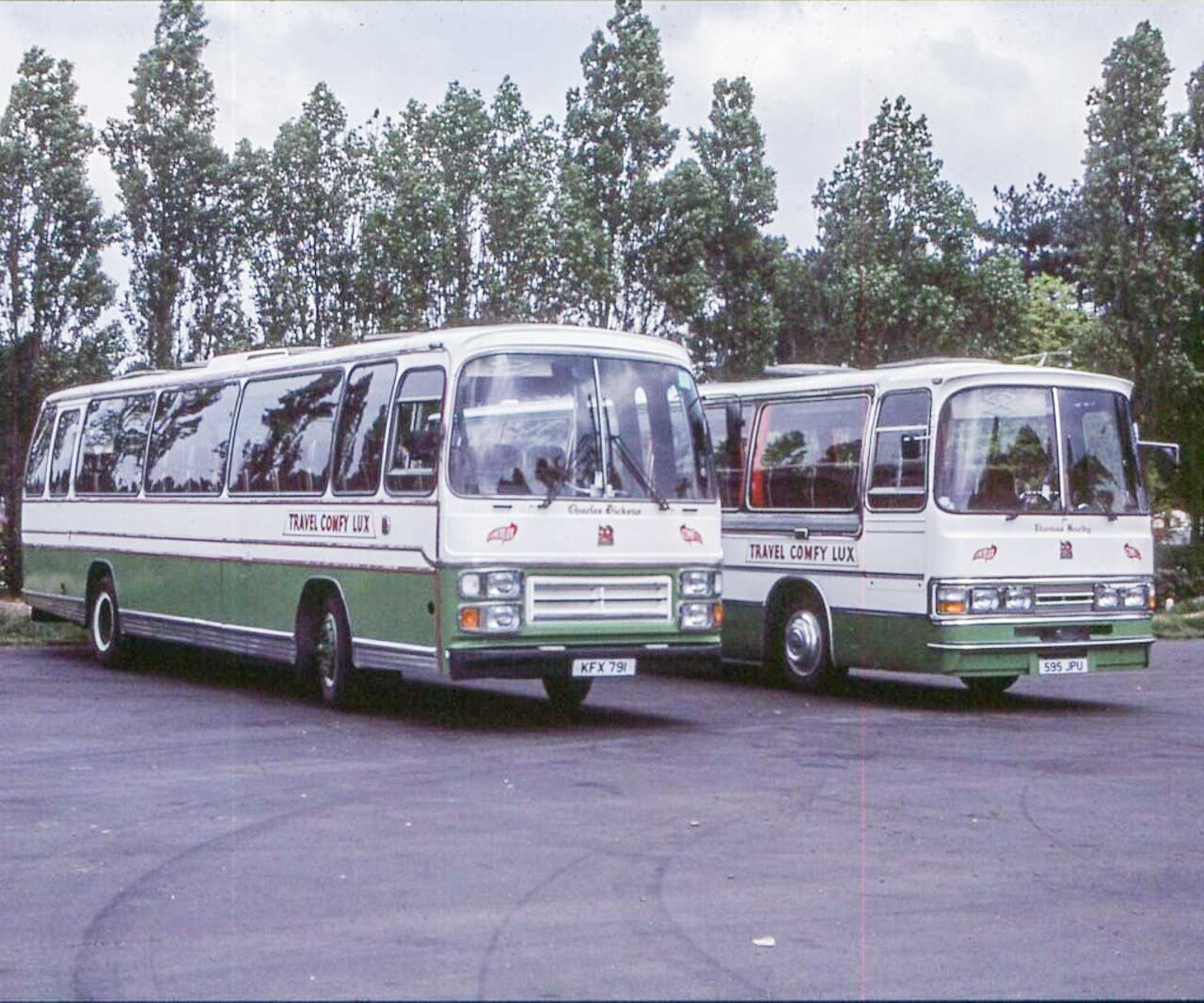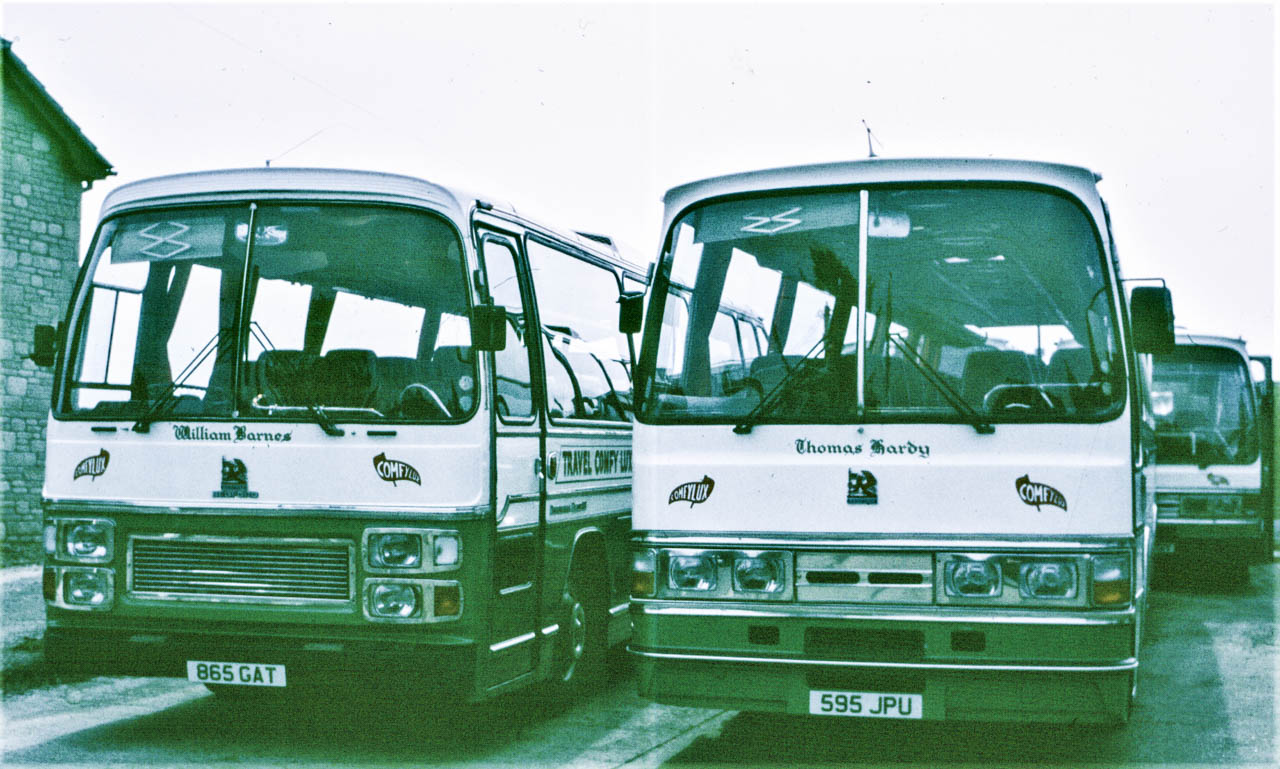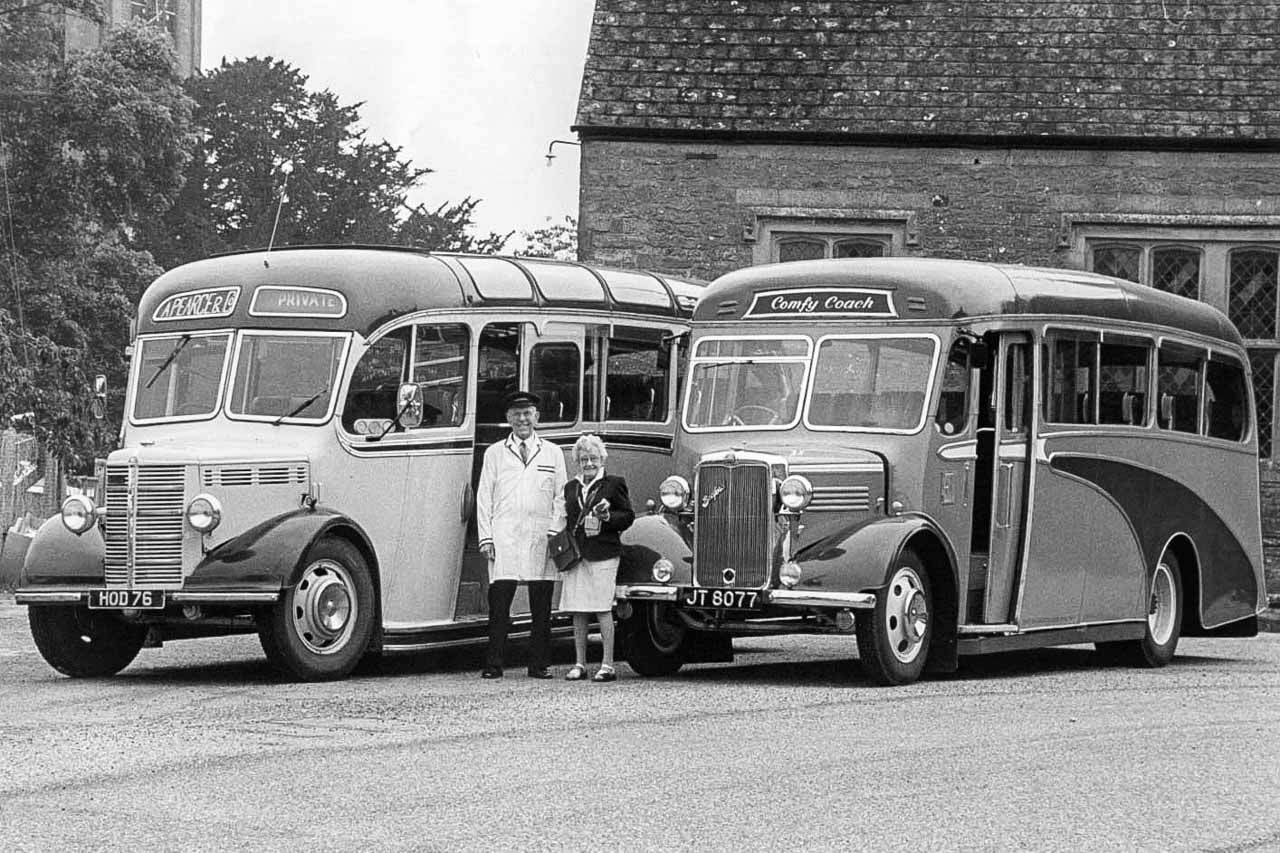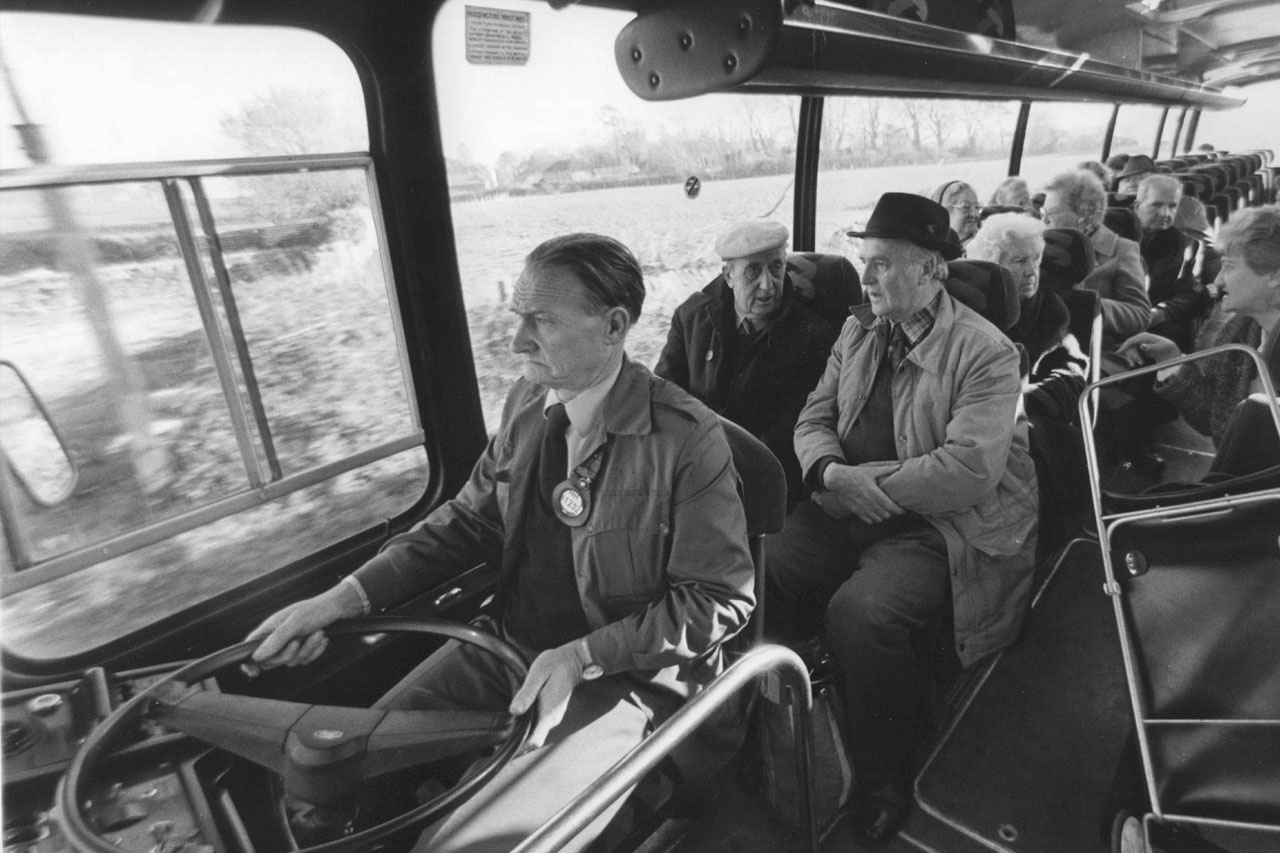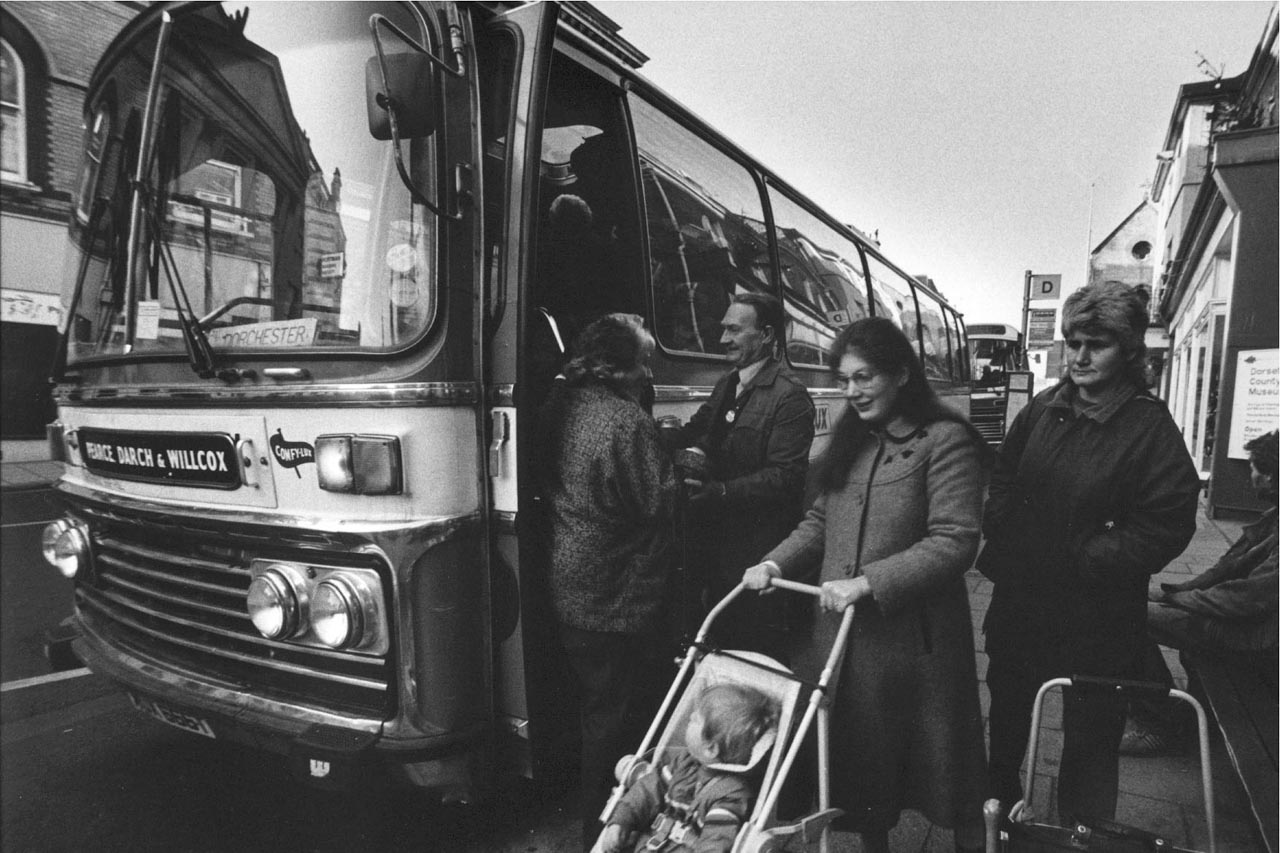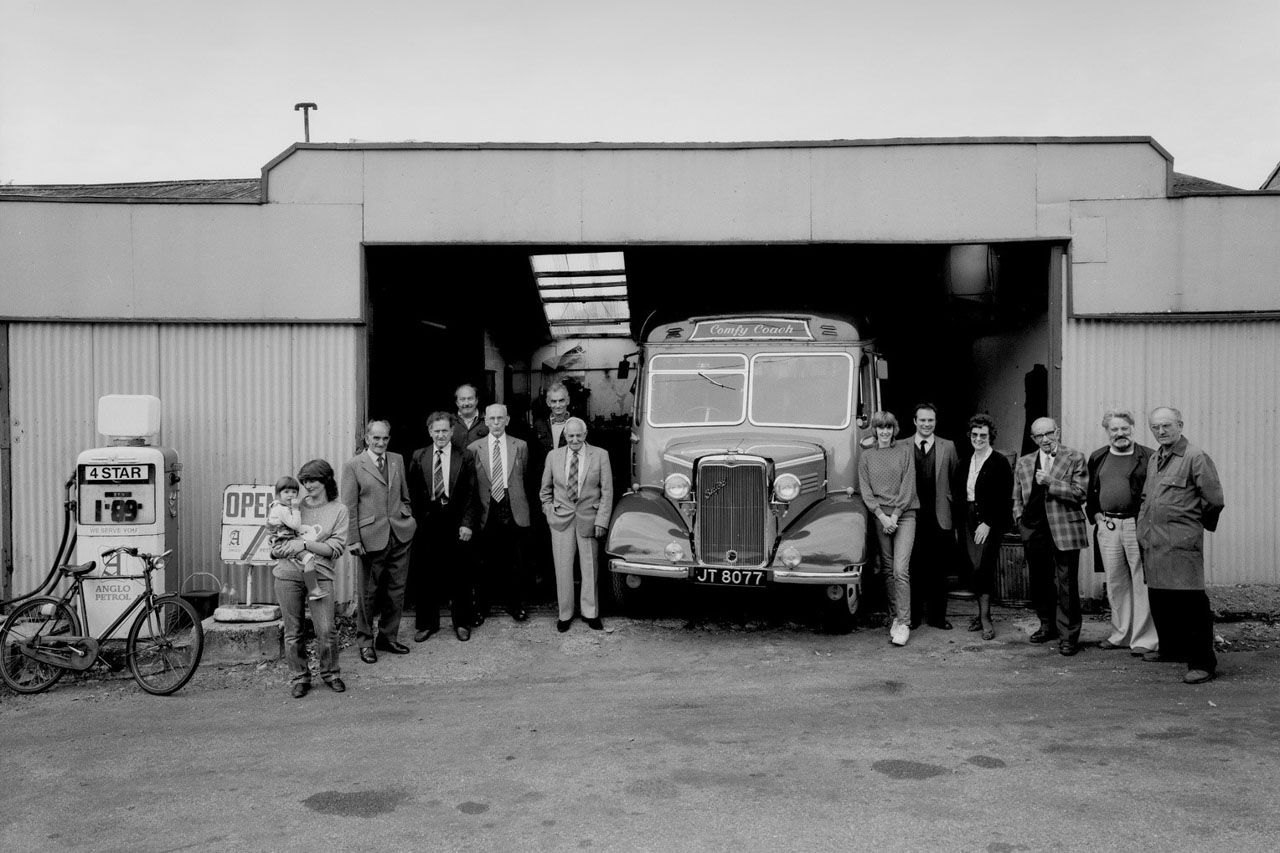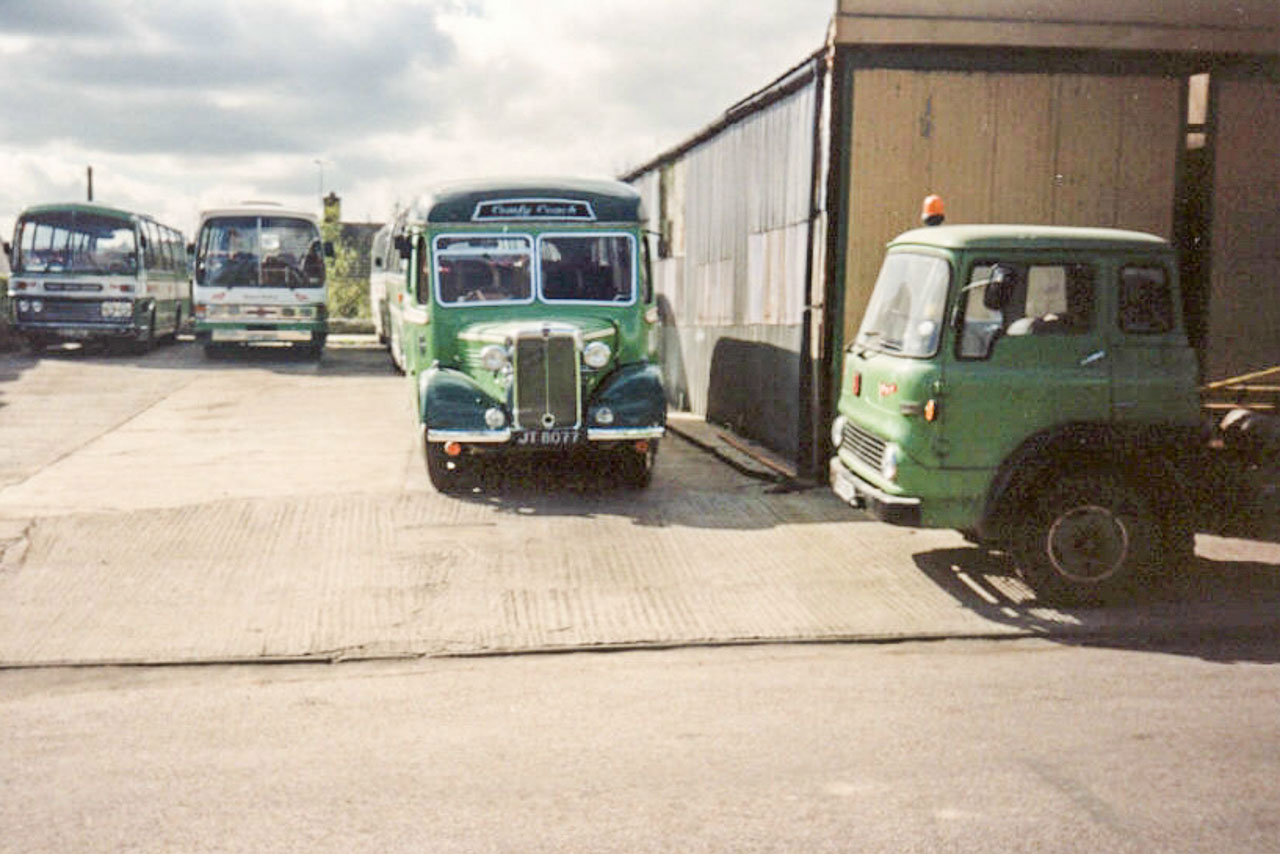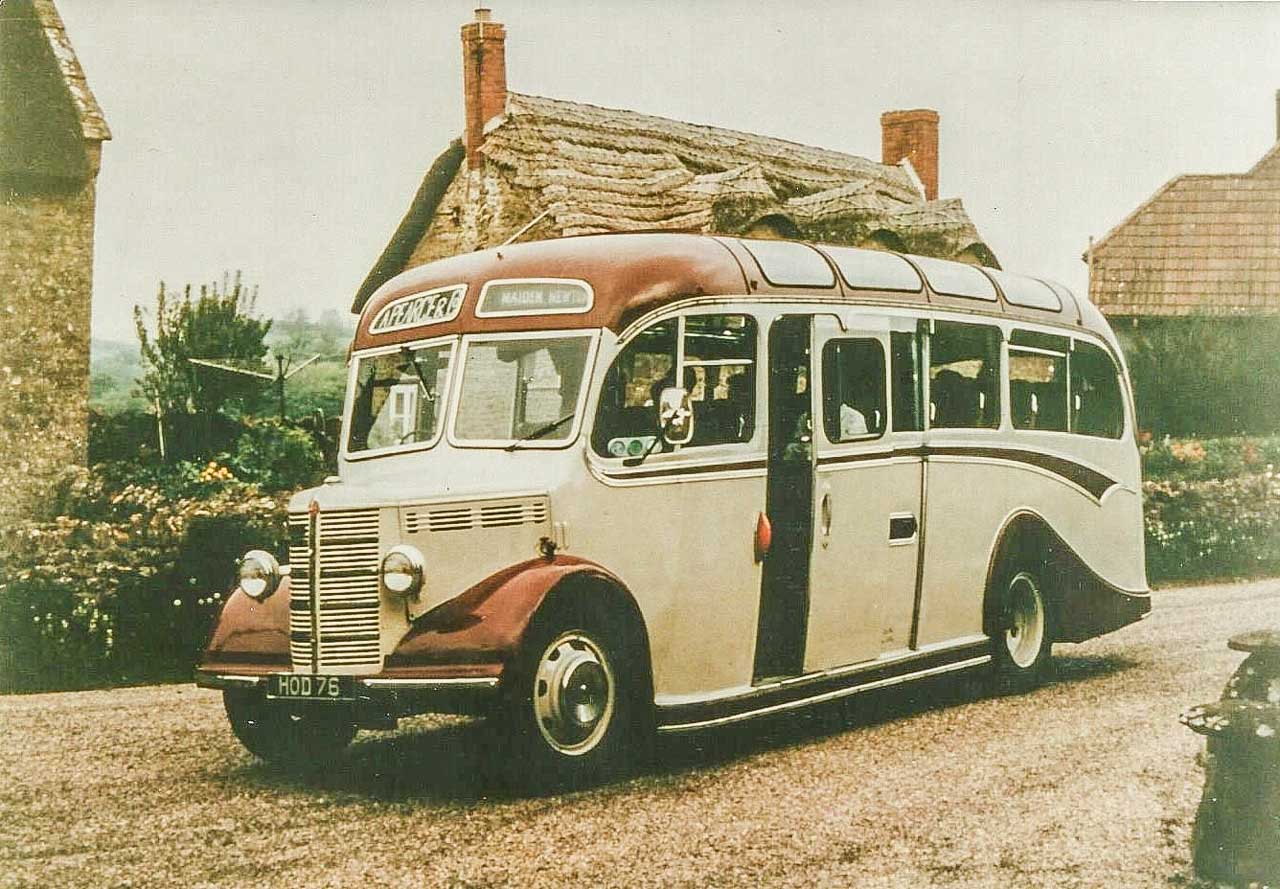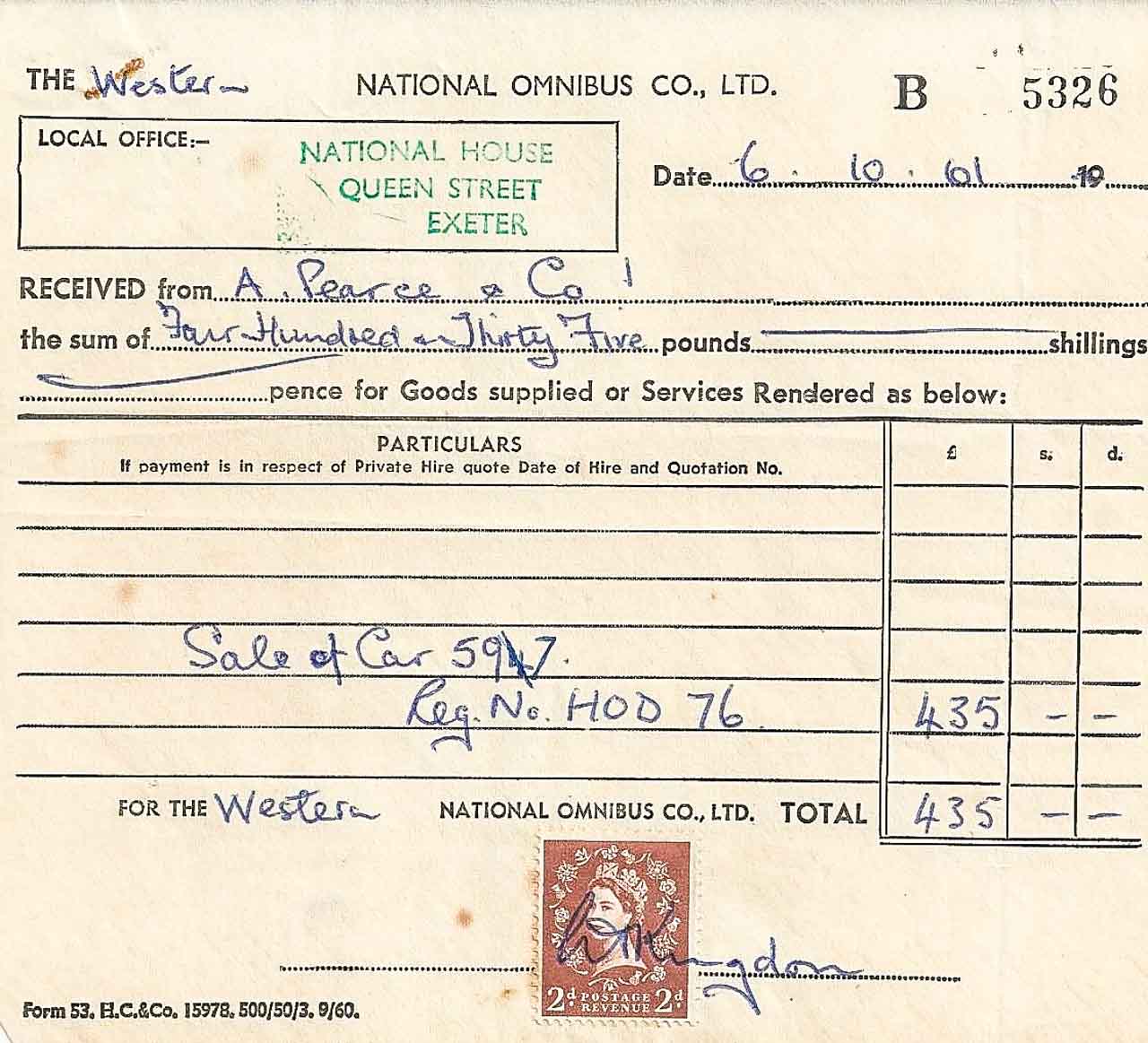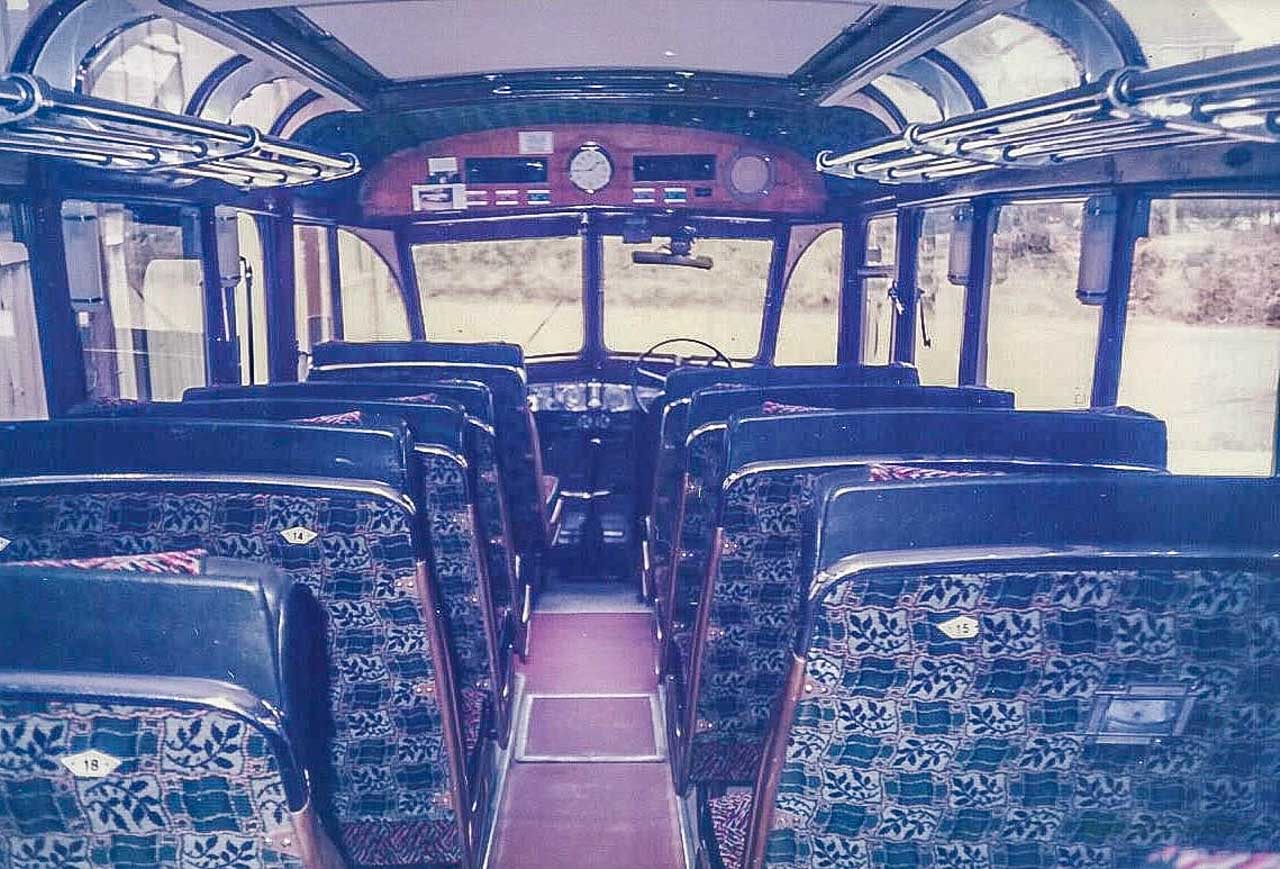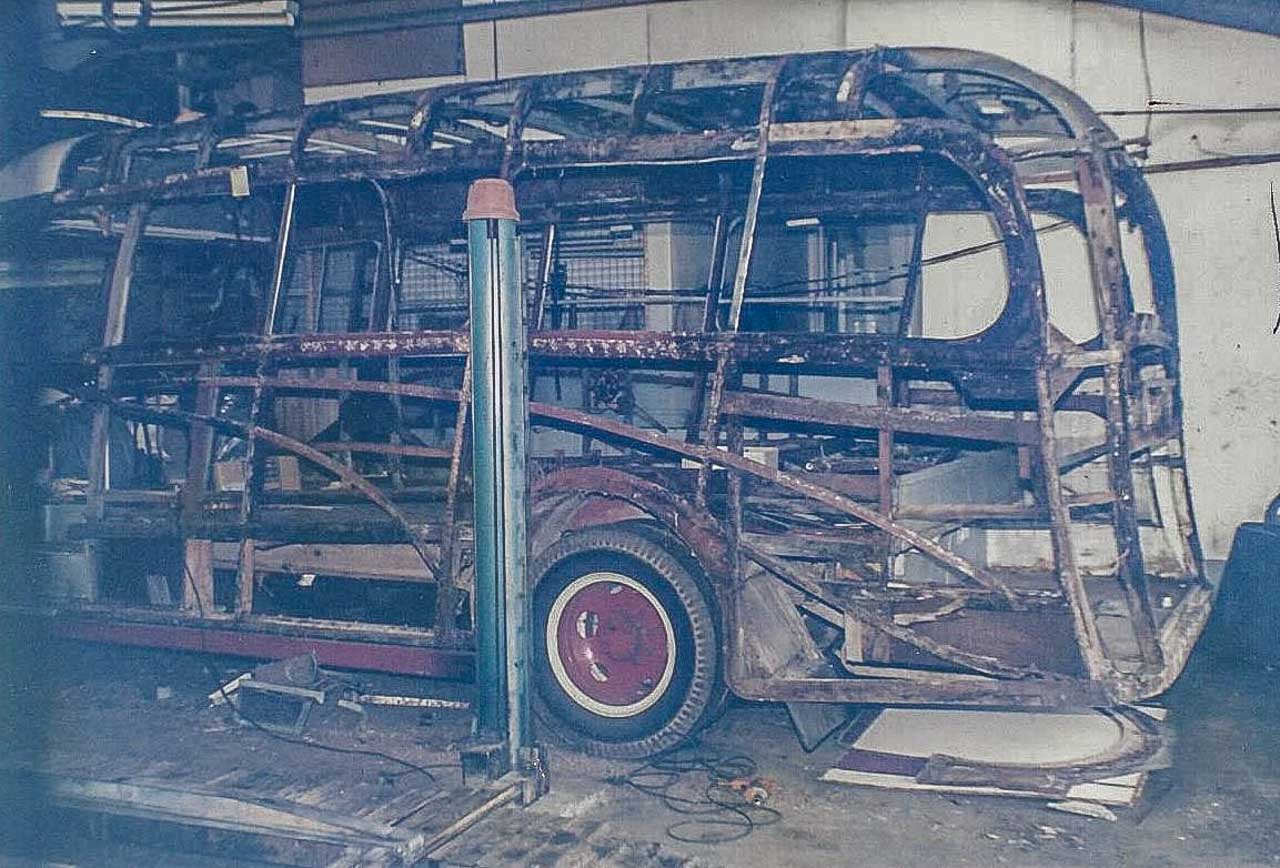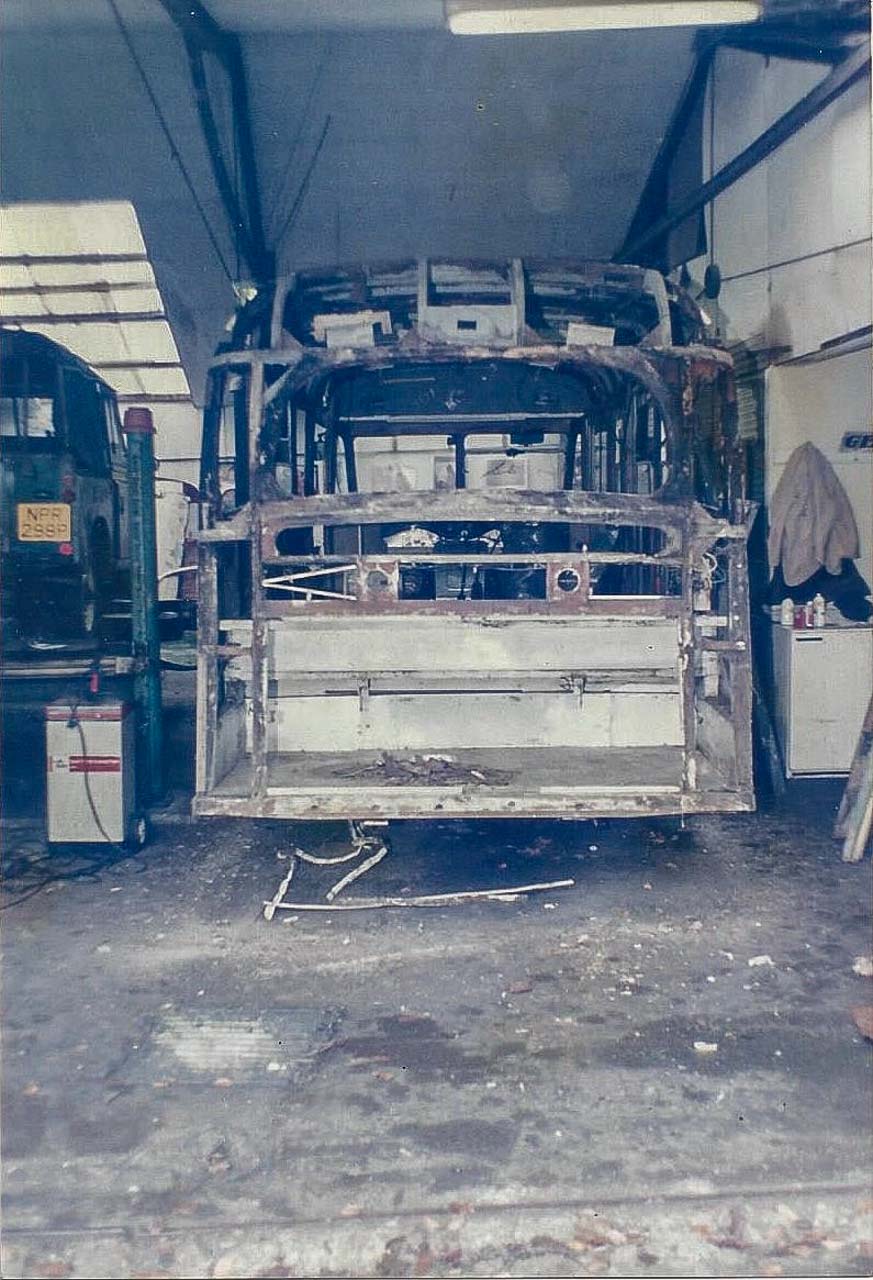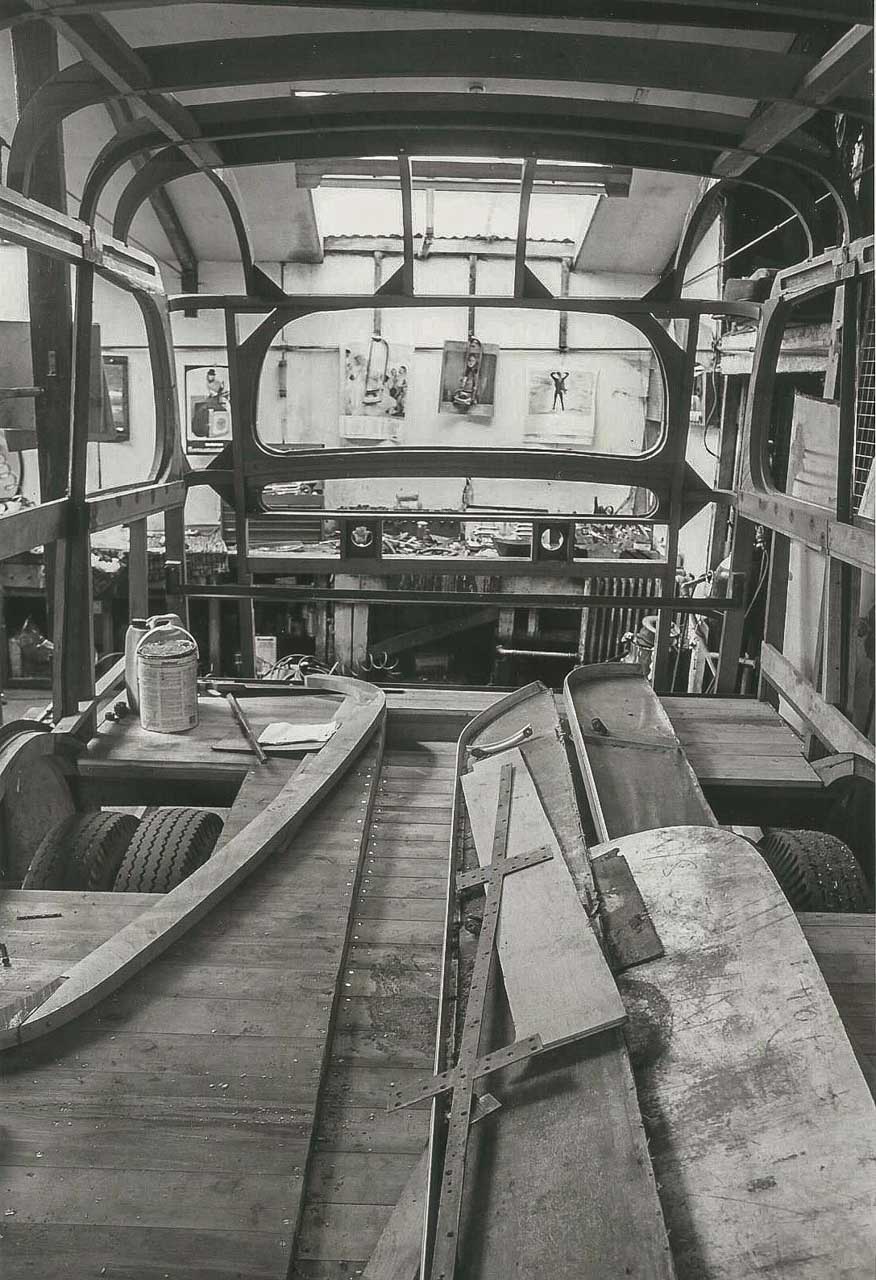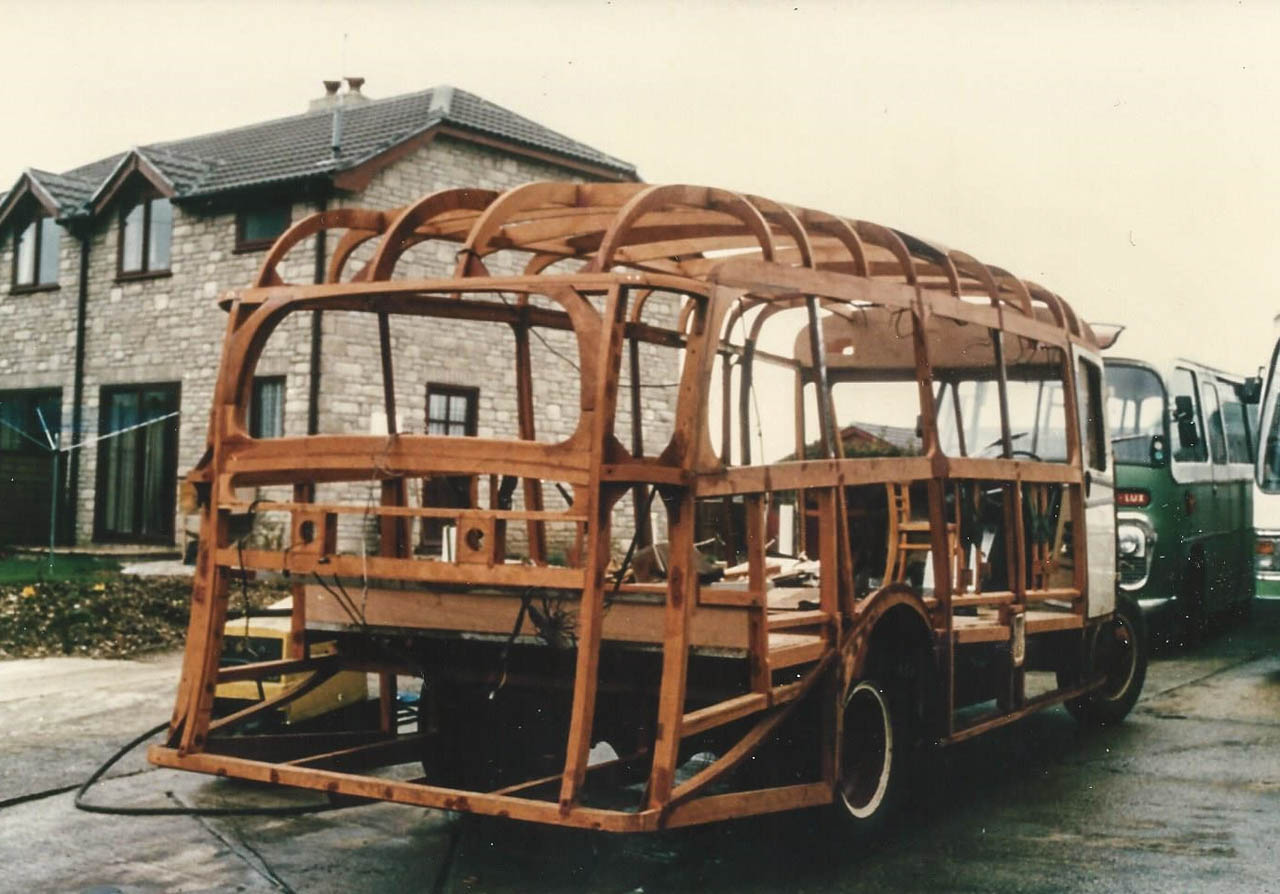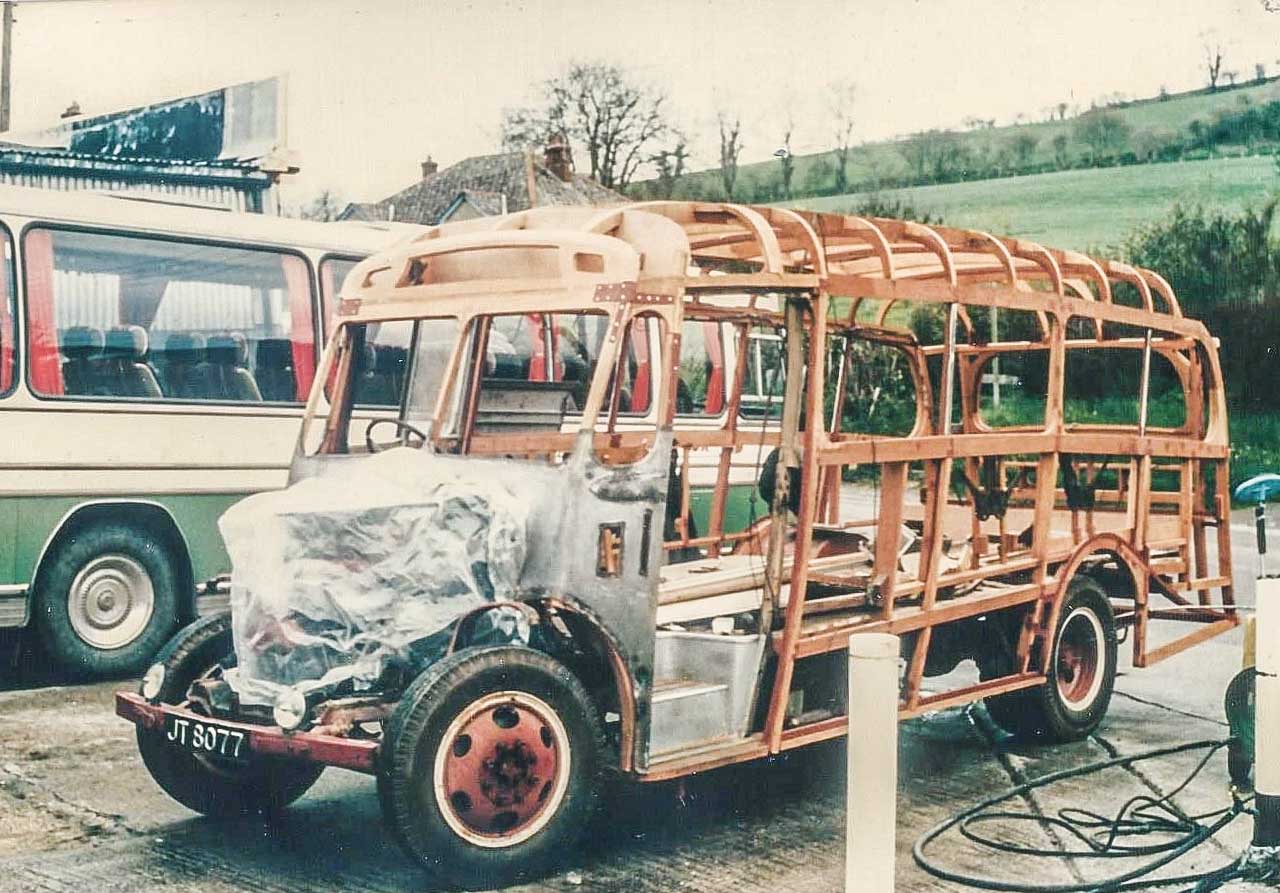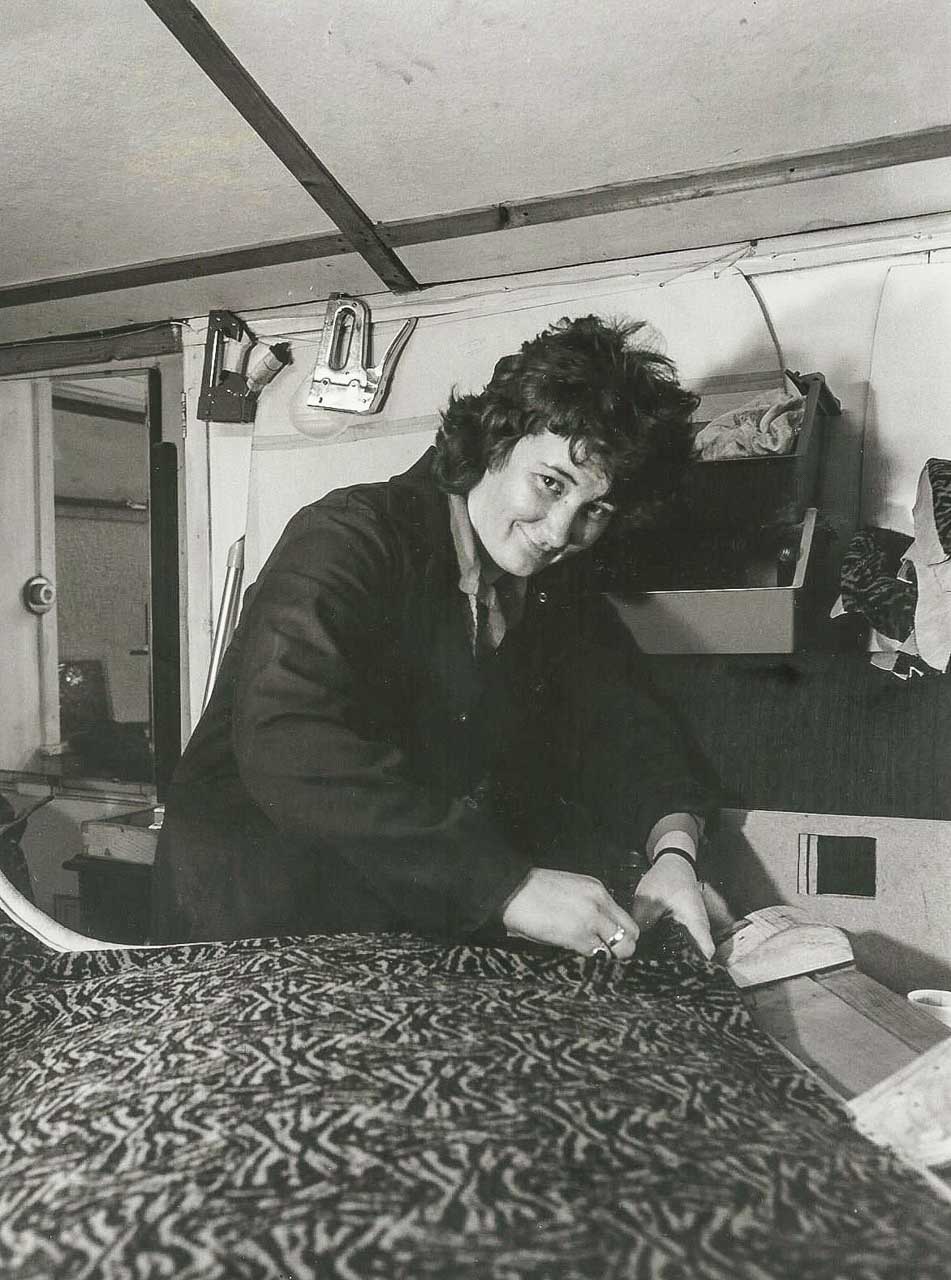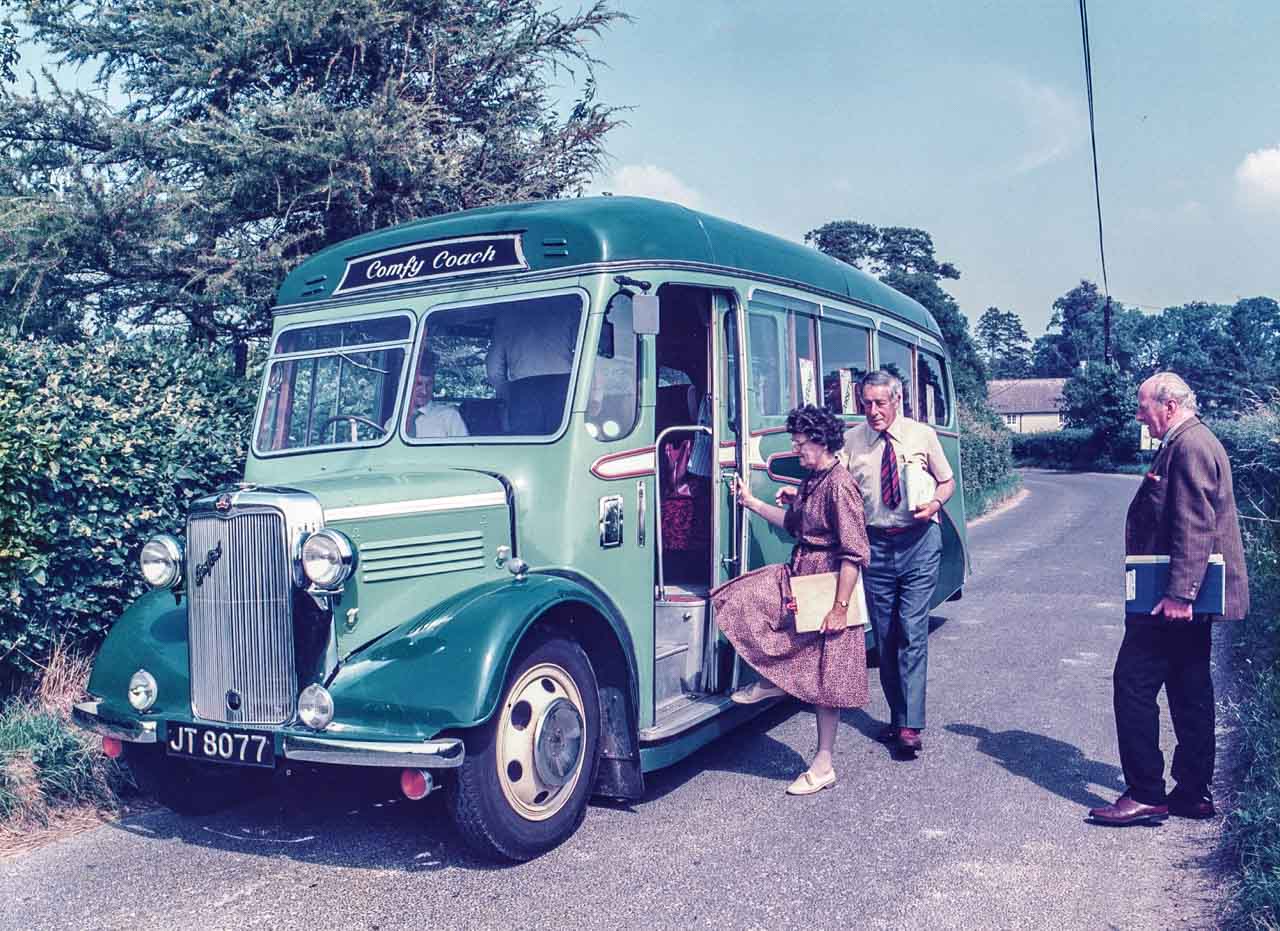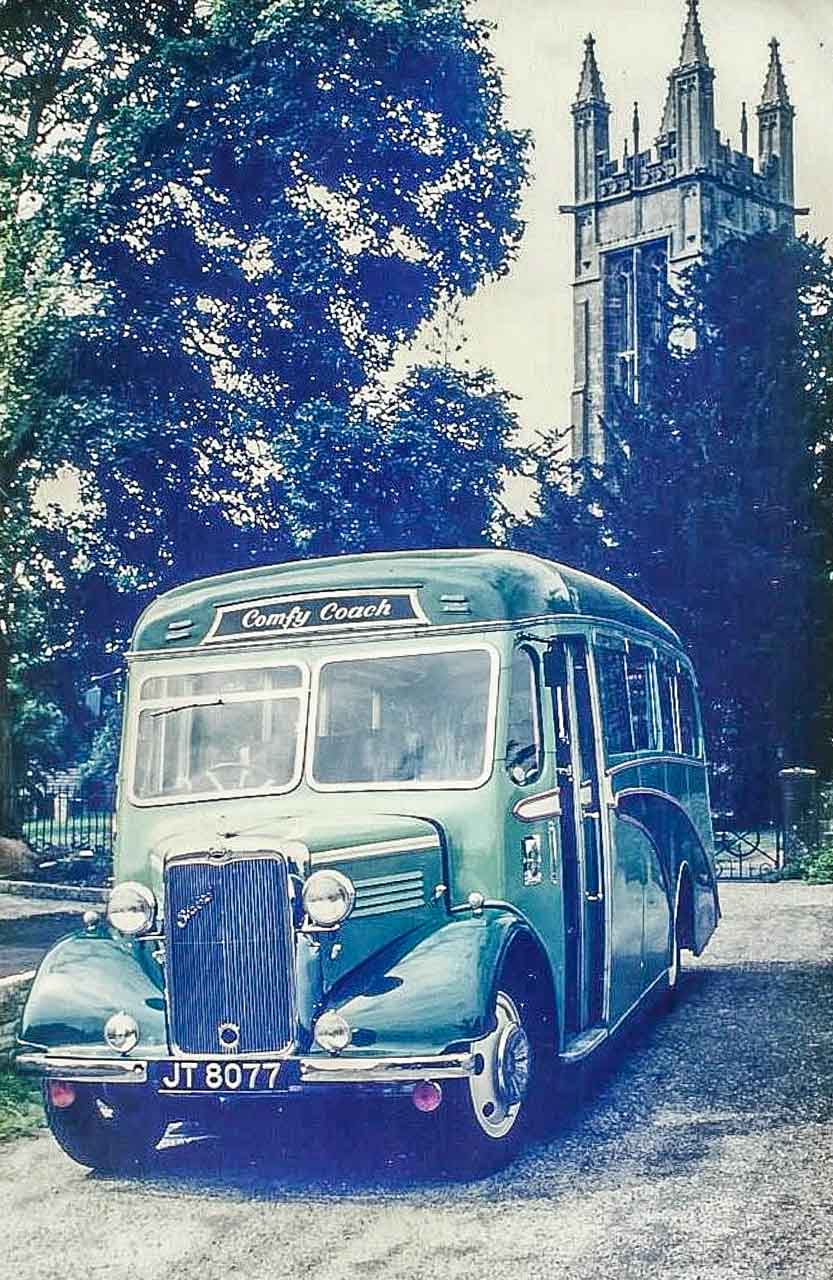Nigel and Shelley
(Written by and copyright Nigel Collins)
An introduction to a family business in Cattistock
Nigel’s family ran a bus and coach business from the village for over 70 years. The green and white ‘Comfy-Lux’ coaches were a familiar sight in the 70s and 80s and older residents will doubtless recall the maroon and birch grey ‘Pearce’ vehicles from earlier years. Nigel’s and more latterly Shelley’s lives were entwined with the business, which was a way of life. It’s also fair to say that the company’s history is interwoven with that of the village.
We hope you enjoy this story of how a thriving bus and coach business was formed and developed by a Cattistock family.
Instalment 1. Up to the start of the 2nd World War
Albie & George
Nigel’s Great-Grandfather Albie Pearce was born in Holywell in 1877. One of ten siblings, Albie had several jobs in the area, generally anything agricultural, or horsey. In 1905 he went to Dorchester for the Candlemas Fair, where farm workers wishing to change jobs offered themselves for hire. That resulted in Albie finding employment at Manor farm Cattistock, working for the Ransome and Hooper families initially as a Gardener-Groom and eventually as the Chargehand.
His modest home was No. 763 Cattistock, one of a pair of farm cottages long since knocked into one. The high number on the door relates to the number of the house on the Digby Estate. The Ransomes and the Hoopers were tenants albeit “Gentlemen Farmers”.
To supplement his income, he hired out bicycles, which were kept in a shed next to the cottage. Being a Methodist Lay Preacher meant he could not trade on a Sunday. So customers had to collect cycles before midnight on the Saturday and return after Midnight, early on the Monday Morning.
A few days after Armistice in 1918 Albie’s business expanded when he left the farm and bought the coal delivery and carrier business from Percy Shorto. Using a mule and van he set off for Dorchester on Market days and delivered coal on the other days.
However, not everything went smoothly for the new venture. After the first day of operation the cart was severely damaged, the mule’s legs were broken, and it seemed to Albie as though this might be the end of his business. His transport was immobilised, and he had no money. However, his friend, the local undertaker and fellow Methodist Harry Wills came to the rescue and loaned him £50.00. Albie was back in business.
Having left Manor Farm Albie had to find somewhere to live. He moved to Ramsay Cottage in West End, then little more than a barn! Renting a few fields, 10 cows were added to the “rolling stock”. Horses & carts for road construction contracts followed. This grew the business rapidly and a young lad called George Collins was among those who were employed.
George had originally come to Cattistock during the Great War. Coming from a pacifist Quaker family he nevertheless tried to join up but was sent back for being underage. Unfortunately, because of his family’s pacifist beliefs he couldn’t go home and came to work at Manor farm under Albie.
Eventually he did get to go to war and was one of the lucky ones that came back. Following demob in 1919 he still couldn’t go home and came back to Cattistock to work for Pearce’s. George had his sights set higher though and married the boss’ daughter, Ethel, in 1923 and became part of the business.
The first motorised bus was bought in 1923. Based on a Ford Model ‘T’ chassis, it had 14 wooden seats. The “Tin Lizzie’s” seats were folded up on non-Market days so that it could be used to deliver coal. This was supplemented with a second vehicle purchased in 1929, which had upholstered seats!
Passengers didn’t have to travel to get their goods! They just displayed a ‘P’ in the window and the driver would stop and would take their order for provisions, clothing, shoes etc for delivery on the return journey. Who says home shopping is new!
Although displaying the ‘P’ ceased at the commencement of the 2nd World War the delivery of parcels continued until 1972 when the introduction of VAT made it too complex for the on-bus ticket system. Nigel well remembers discounts being received from various Dorchester stores including Bailey’s the gent’s outfitters, White’s shoes and County Stores, the grocers. These shops would pay Albie a commission and the customer would pay a carriage charge
The amount of goods carried regularly exceeded the revenue from passengers and racks were fitted to the roofs to enable a larger payload. On one occasion a new pram was duly installed on the rack, but on arrival a disgruntled customer was not amused when the pram was missing. Subsequent inspection found it dangling from a tree!
In the 20’s and 30’s the main core of the business was in haulage, primarily on contract for Dorset County Council for road construction. Another substantial contract was the delivery of Ford Tractors imported into Southampton Docks from America. This necessitated larger vehicles and there was quite a hue & cry when a Peerless truck was purchased as many locally thought it was too big for Dorset’s roads!
It was not unknown for a lorry to be adapted to carry passengers and the first excursion was operated to the “Tidworth Tattoo”. Despite the discomfort it must have been successful as many more excursions, especially to the seaside, followed. Despite the heavy investment in new-fangled motors, horses and carts will still employed on local haulage until 1937. Albie sold his cows and farm at the same time.
From 1930 the drivers and vehicles had to be properly licensed. Bus drivers had to take a PSV [Public Service Vehicle] test. There was a problem though. The Ministry of Transport decreed that the tests had to be taken on a Wednesday morning in Dorchester. That was Market day, so no buses were available! Albie took in a lorry, discussed it with the local examiner, and the said lorry was used for the test. The Traffic Commissioners never knew. Imagine the newspaper headlines now!
The 1930s saw an increase in passenger travel and the first school contract was obtained in 1933 when Dorset Education Committee centralised education for older Children. When pupils over 11 were transferred from Cattistock to Maiden Newton it was intended that they should travel by rail, but the Great Western Railway refused to stop convenient trains at Cattistock. Albie priced his 14-seater to carry 20 children (3 to every 2 adult seats) at 8/- a day. It fitted in with the Dorchester service, so no additional bus was required.
Instalment 2. The 2nd WW and onwards
The outbreak of the 2nd World War meant that all bar one of the lorries were commandeered and, whilst some passenger transport operators near to military establishments experienced rapid growth, elsewhere only essential journeys could be undertaken. The Pearce fleet was subsequently reduced to 2 buses, 1 elderly lorry for coal deliveries and 1 ambulance for emergencies. In addition to his heavy involvement in the business George was also an ARP warden and drove the ambulance, regularly accompanied by Ethel who volunteered for the Red Cross.
Ethel
The immediate post war years were austere for many but not for those operating buses and coaches. Whilst petrol was rationed, the bus services and school contracts were all deemed essential as people needed to get to work, shop for groceries or attend school.
After the suspension of the Pleasure motoring allowance in 1947 coach excursions and tours became extremely popular leading to a substantial increase in patronage.
Although the carriage of goods and parcels was still an important source of income, the coach business expanded rapidly. In the surrounding towns and villages every organisation from the Sunday School to the WI had coach trips and sports fixtures at weekends, which integrated nicely with the school and local bus work.
There was a serious shortage of vehicles though, leading to some wonderfully varied acquisitions. One such was fitted with what was then known as a ‘Utility Body’. Its first job was to convey Cattistock Cricket Club and assorted supporters to an away match. Apparently, the supporters got excited at their teams dramatic batting and decided to climb onto the roof to cheer their heroes. Suddenly the cheering turned to shouts of alarm as the canvas roof gave way. To add insult to injury they were suitably drenched by a summer downpour on the journey home. Thenceforth some of the locals refused to ride in it, so the bus was re-bodied by local firm Vailes of Hazelbury Bryan under Nigel’s dad Ivor’s guidance and design. Nigel remembers his peers at school referring to it as the ‘Matchbox bus’ because of its square appearance, although its Harrington coach seats were extremely comfortable. Despite its somewhat austere exterior it proved a valuable workhorse remaining in service until 1966.
Just as the future looked good though, tragedy struck. In 1948 George at only 48 died of cancer. His 21-year-old son Ivor was in the Teacher Training Corps at Chester. He was summoned in person by the late Mannie Shinwell (Govt. Minister – then Secretary of State for War) and told he was to return home and help run the family bus and coach business. His ambition to teach had to be forgotten.
However, Ethel very much remained the boss. She had her 3 musketeers as she referred to them: Lew Tompkins, Pete Watts, and Lionel Rogers. Albie, although now in his 70s, was still around as a sounding board.
Even though she undoubtedly welcomed Ivor’s help; there is also no doubt that she was not prepared to fully relinquish the reins. To modern eyes it may seem inconceivable that she should have to; but in 1948 it was equally inconceivable to the Powers that be (i.e. the Traffic Commissioners) that a woman could run such a business on her own! But run it she did and continued to do so until her death in 1973.
Ethel had strong moral principles. Nigel recalls a coach dealer promising her a particular vehicle. “We drove up to Loughborough to collect it and the guy had sold it to another operator. He tried to palm her off with a different coach. She told him straight that she would never deal with him again. And she didn’t. We drove to visit his rival, also in Loughborough, where she promptly bought not one but two coaches!”
Ivor & Hazel
Ivor, of course, became a partner in 1948 and brought some much-needed modernisation to the business in accounting, timetabling, and booking systems and also through his engineering acumen. He was a great admirer of the Midland Red bus company who had a reputation for re-building and refurbishing their vehicles. A practice he emulated on a smaller scale and which continued as company policy until its sale in 1990.
New vehicles became available with the ever-flowing work, including additional contracts for the Police Training Centre at Chantmarle. These were real luxury coaches and in 1951 were used to convey visitors to the Festival of Britain from all over the area. The new vehicles established an excellent reputation and work came in from Yeovil and Dorchester. Travel was new and exciting for many of their customers and Ivor used to recall how many of the passengers visiting London for the first time would follow him around all day for fear of getting lost!
All these coaches came with large ‘Sunroofs’. A brilliant idea on a sunny day when nearly half of the roof could be slid back. Not so good after a thunderstorm, however. When one driver thought it a good idea to open the roof one afternoon having forgot that morning’s down pour it resulted in four ladies getting thoroughly drenched when he suddenly had to brake!
The first minibus joined the fleet in 1954. It was painted black and contracted to the local undertaker (Bunter Burt) as a hearse. You had to book the funeral between schools though! Amended regulations meant it had to be replaced a few years later. Hazel, Nigel’s mum, passed her PSV driving test on one of minibuses and drove a school run, working in the office between journeys.
1954 was also the year that Pearce’s acquired local rivals Legg’s who ran from Evershot, and Lovell’s Sydling based business.
Sadly, Albie passed away in May 1955. He’d seen his company develop from humble beginnings to a leading operator in the area.
1956 saw a major rail strike and a major influx of passengers for Pearce’s. The services blossomed and besides their own private hire and excursions additional work was carried out for “Royal Blue” on their Weymouth to London or Exeter to Bournemouth Routes and for the Yeovil based Barlow, Phillips.
The coaches were getting higher and longer so the garage too had to be altered and expanded. In 1957 “Bunter Burts” neighbouring carpenter shop was purchased, and a new workshop was gradually built by the staff in between other work over several years. A car repair business was also started to fill the mechanics time when the coaches were out.
Longer journeys were run, and excursions and tours prospered with visits to Blenheim Palace, Windsor, and Stratford upon Avon frequently offered. Combined boat trips on the River Thames and Dart became popular. By the 1960s Ethel had relented, with Ivor’s strong encouragement on the need to modernise, and Sundays became a busy day. That change also enabled the introduction of holiday tours. The first being a 4-day tour to Chester & North Wales, which Nigel recollects was sold for the fully inclusive price of 11 guineas!
Instalment 3. Nigel and Shelley
Nigel’s early memories
Nigel attended Cattistock school; taught by Miss Trevit and Alan Hodgson, a lovely guy who Nigel attributes to instilling him with a broad outlook on life. However, he also lived next door to the former headmistress Miss Seabrook, a great friend of his grandmother’s. Miss Seabrook and Ethel regularly played scrabble in the evenings and who equally regularly used to summon Nigel for extracurricular maths and English. He remembers trying to creep out hidden by the hedge during the school holidays only to be summoned by a high pitched “Niiiiigoool” as he reached the gate. He recalls a debate between Mr Hodgson & Miss Seabrook on the best methodology of ensuring the three Rs would be imbibed by “such a child”. Despite their differences in approach, in fact probably because of them, it resulted in his attendance at Hardye’s grammar.
Nigel spent every minute that he wasn’t at school either at the garage or accompanying the 3 Musketeers on the trips, often on a stool as the seats had to be sold! The 3 Musketeers drove the coaches in the summer and the coal lorries in the winter.
Mind you the 3 musketeers were not always in Ethel’s good books! It was around autumn half-term and Lionel was supposed to have been taking Ethel to Bournemouth to pick out the seasons pantomime Tickets. She always preferred to do business face to face, and it usually worked with beneficial discounts and good contacts. Lionel had not returned – he’d forgot! Hazel was seconded to drive Ethel and Nigel went along for the ride. But instead of going to Bournemouth they first drove to The Tigers Head at Rampisham, then the Talbot at Benville before finally running across the trio at The Swan in Toller Porcorum! Nigel recollects finding it hilarious to see three burly blokes running out of the pub at the sight of his Grandmother who was barely 5’2”!
Harold Vine (Known as Cherub because he was always singing or whistling) always drove the Yeovil routes. Harold was always cheerful even when he was severely reprimanded by the local constabulary for offloading something like 50 people from a 29-seater outside the police station in Yeovil.
Dave Tompkins and Terry Coles (later Keith Wall) were the mechanics and Keith Gibbs was apprentice/handyman. Nigel reckons that it was from Keith Gibbs that he learnt his first lesson in customer care. A rather large gentleman called in and asked if we knew “how the trains ran to Dorchester?” Not a wise question to ask at the premises of a rival bus company, and Keith very politely replied “On rails I believe sir”. This resulted in Keith biting the dust and wishing he hadn’t replied quite so literally!
Beaminster school opened in 1963 and contracts to convey the children from the surrounding villages were procured, which compensated for the drop in coal sales. Many people were now installing central heating, so by that time the lorry fleet was down to one delivery lorry and one elderly tipper truck and the coal business was sold to Bryer Ash Ltd in 1967.
By 1964 the fleet numbered 9 coaches and two mini-buses and it became a limited Company. The worrying sign though was that people were beginning to buy cars of their own and loadings on some of the bus routes were starting to decline. The railway was also suffering, and Dr Beeching’s axe was imminent. Amazingly the Maiden Newton to Bridport line continued unscathed until 1975; but the services on the Weymouth to Bristol line were curtailed dramatically. Stations were closed including Evershot, Cattistock, Grimestone & Frampton, and Bradford Peverell & Stratton. British Rail contracted Pearce’s to run extra routes. In those days it was highly unusual for British Rail to work with a private bus company and the contract was down to Ivor’s excellent negotiating skills.
The coaching side continued to hold up. The holiday trips were still popular, with an excellent client base. That increased even further with the merger with Martock based Darch & Willcox Ltd in 1972. Nigel joined the company in the same year as a trainee manager.
Prior to setting up his own business in 1947 Glen Wilcox had been the General Manager of Bere Regis & District Motor Services and he and Ivor found they had common ground in refurbishment based on ‘Midland Red’ principles. Whilst some new vehicles were acquired many were extensively refurbished. The economics were straight forward. Only 25% could be written off against tax for a new vehicle, whilst for refurbishment the allowance was 100%.
The company had an excellent cohort of skilled mechanics headed by Dave Tompkins (who became a director) and Alan Yarde, the Martock depot foreman. Most of the refurbishment was carried out in the winter.
In the summer and in the run up to Christmas it was common to run multiple duplicates. When additional vehicles were required office staff and mechanics were obliged to drive, usually the slightly older coaches. As Nigel recalls:
“I was driving coach No. 4 to Bristol on a Saturday before Christmas in 1976. It was one of only two vehicles that still had a petrol engine. We encountered heavy fog until we were just passing the Down Side Inn, when the sun came out and it was glorious. Unfortunately, on this vehicle the headlight switch was located around the ignition key. In my haste I cut the engine as I turned the lights off. Panic ensued with some of the party crying “On no we’ve broken down”. I too was concerned as I coasted into the pub car park and then the moment of truth dawned. Relatively green behind the ears I wasn’t about to admit that I’d made a faux-pas and releasing the bonnet pretended to sort the problem. “I think I’ve fixed it” I shouted as the old girl roared into life. On arrival at Bristol the passengers were ecstatic singing my praises. As they dispersed one of the three old hands, Dick Stockley, turned and said, “Turn the lights off did you son?”. The teas were on me!”
In 1975 a new service to Bridport was introduced to replace the railway and all seemed fine with work continuing to come in. Then the phone went one summer day in 1978. Ivor had collapsed. He recovered but was wheelchair bound for 7 years. He could only walk a few feet without being breathless and he never drove again.
It was now down to the fourth generation, Nigel, to take the helm at the tender age of 23. He had his dad’s knowledge to lean on, of course, and Glen’s experience was invaluable. Although well past retirement age he continued to work, and Ivor still oversaw the books. Glen, Dave, and Alan oversaw the maintenance. Nigel recalls “The staff were brilliant. It’s at times like these that you learn who you friends are”. Sadly, Ivor’s condition worsened, and he died in January 1985.
Nigel & Shelley
Shelley joined the company in 1980 as a receptionist in their Yeovil office. She was acutely aware of the commitment needed to run such a business; her father having been involved in the bus and coach industry. She quickly grasped, revised, and streamlined the booking system for the expanding holiday tour programme. Love blossomed and Nigel and Shelley married in 1986. The company continued the policy of refurbishment and more fuel efficient and quieter Cummins engines were fitted to some of the coaches. The staff became very skilled at this type of work. Dave Tompkins, Keith Wall and Alan Yarde all had an encyclopaedic knowledge of Bedford and AEC coaches. The excellent team also included Keith Jeffrey (Jeff), who was highly adept in both wood working and welding, and Thelma Tompkins (who still lives in Cattistock) was both a qualified Traffic Manager and skilled upholsterer. They were aided by a first-rate and long serving team of mechanics and drivers.
However, time moves on and sadly, the family’s Dorset operation ceased in 1990. The company lost the Dorset County Council school contracts and the local bus subsidies more or less simultaneously. The Cattistock depot was no longer viable. The directors, most of whom were now approaching retirement, decided enough was enough and the Somerset operation was sold to Cawlett Ltd, who owned Southern National (now part of First Group). The 2 newly established companies that had taken over the Dorset School Contracts both ceased trading within a couple of years and the new “Comfy-Lux” under Cawlett ownership, with Nigel as General Manager, were successful in regaining some of the routes!
Both Nigel and Shelley were used to running their own company though and in 1994 set up a successful business distributing beverages. Nevertheless, the call of passenger transport beckoned. Alan Graham had formed South West Coaches in Yeovil and following the purchase of Wakes Coaches invited Nigel to join him with a free hand to set up a Coach Tour programme. The challenge was too good to miss, so the distribution business was duly sold, and Nigel joined Alan and his team in 2000.
Although he thoroughly enjoyed his time at South West, Nigel was acutely aware of the transport and isolation issues that were emerging in rural areas. An opportunity arose to at least attempt to address some of these issues in the South Somerset area and Nigel joined South Somerset District Council in 2003 as their Strategic Transport Officer.
Both Nigel and Shelley have been active members of the community serving on the Fete Committee as Chair and Secretary for many years. More recently they initiated the now Famous Dorset Knob Throwing and occupied the same roles on that committee for 10 years. Nigel also did a 13-year stint on the Parish Council, which also included a period as Chairman. He is now retired, not that he has any spare time though. Current Projects include writing a book, messing about with wood (he says “he’d make a good woodworker like Jeff cry!”) and polishing his beloved MGB GT. Shelley still works part-time in administration and the couple enjoy walking their dog and travelling in the MG – the coach substitute!
Anyone wishing to further enquire about any of the information provided in Nigel and Shelley’s article, please contact Nigel at: collins.cattistock@hotmail.co.uk
Instalment 4. Cattistock’s Vintage Coaches
Probably the best illustration of the skills of the staff at Cattistock garage is the refurbishment of 2 lovely old vintage coaches.
HOD 76
Older Cattistock residents of Cattistock will recall HOD 76, a 1949 Bedford OB 27-seater. HOD joined the fleet in an unorthodox way because of bad weather in early 1961. A much more modern coach had had a collision with a snowplough and required extensive repair. The family were busy with pantomime trips etc. and needed a vehicle to cover some of the local work. The Western National Omnibus Co. LTD agreed to loan and subsequently sell the spare ‘Royal Blue’ vehicle at their Newquay depot for the princely sum of £435.00.
Ivor loved this coach, which had done an exceptionally low mileage and it ran alongside the frontline vehicles until he was no longer able to drive after an illness in 1978. He refused to see it sold, although it still had to earn its keep! So, it was decided that it would be refurbished. This involved replacing some of the Ash Timber frame, which was put in the skilled hands of Keith Jeffrey (Jeff). Dave Tompkins reconditioned the engine and other mechanical parts, whilst Thelma Cooper undertook the reupholstery. Paul Tompkins, Dave’s son, recalls being drafted in to assist including recovering the backs of the seats. Paul worked part-time and was the was the third generation of his family to drive for Comfy-Lux.
This was done over a considerable period as the priority had to be running the core business. Sadly, that meant that Ivor never got to see result, which proved remarkably successful with ‘old HOD’ becoming popular at weddings and with film crews! One such was in the BBC’s adaptation of Agatha Christie’s ‘A Murder is announced’ starring Joan Hickson as Miss Marple! Adorned with Medenham & District nameplates the coach was delivered to Powerstock where a fully licensed Equity member was arranged to drive. This included a journey to the Hotel where Miss Marple was staying, which was in Ross-on-Wye (a.k.a. Medenham). Unfortunately, the Equity Member was not at all comfortable with the Crash Gearbox, resulting in a call from the producer! Keith Wall was dispatched and suitably attired featured as the driver.
JT 8077
The wedding, corporate and film work proved so popular that we really needed an additional vehicle. Norman Aish, who runs Bygone Bedford Bits, and had been an invaluable source of both advice and spare parts in ‘old HOD’s’ refurbishment mentioned that there was an old coach from Dorset languishing in a garden in the Forest of Dean. Further investigations led to the discovery that it was a rare 1937 Bedford that originally saw service with South Dorset Coaches at Corfe Castle. Nigel was excited and mentioned it to a friend who bet him £20 that they would never get the coach up and running and fully licenced to carry passengers. That challenge galvanised the team into action!
They drove up to Coleford to view the coach. Eric Pritchard, in whose garden it rested, explained over coffee and cake that it wasn’t his alone to sell and that he thought it unlikely that we would be able to purchase it. They left a little downhearted and Nigel thought he’d just lost £20! A week or so later though the phone rang; it was Mrs Pritchard inviting them back up. Dave Tompkins and Nigel duly obliged and ‘old JT’ was purchased.
Dave, a magician of a mechanic, got her started and running on 4 cylinders so off they went. The exhaust system was lost as they trundled down through Chepstow and the old girl was still only running on 4 and travelling at around 20mph. And they still had the Severn Bridge to navigate! Halfway across the bridge there was an almighty bang and JT shot forward at around 40 mph.
Back in the garage Dave walked through the coach and put his feet up against a side pillar and pushed. The side of the vehicle bulged! Most of the timbers were rotten and the ash frame would need replacing. Just imagine if they’d attempted that journey nowadays!
Two years of hard graft then followed, mostly in the evenings and at weekends, using the skills honed in the refurbishment of HOD. Jeff undertook the skilled rebuilding of the body. This was a tremendous amount of work as all the old timber had to be removed piecemeal to use as a template for the new. Jeff’s skills in both wood working and welding should be applauded for without him the project couldn’t have happened. Dave, who is sadly no longer with us, had an encyclopaedic knowledge of Bedford engines. He set about reconditioning the engine and other running parts. Both were ably assisted by mechanics Keith Wall and John Hunt (both of whom are now sadly deceased). Thelma Cooper set about reupholstering the interior. Again, with amazing skills. Nigel had the task of obtaining all the parts to as near as possible original spec. Not so straightforward in those pre-internet days and the team were indebted to Norman of Bygone Bedford bits who is a mine of information.
It wasn’t all plain sailing in getting JT re-certified as a Public Service Vehicle (PSV) either. All PSV designs are initially type-tested for Department for Transport approval. Unfortunately, the records for the ‘type’ had been destroyed in a fire at Duple’s Hendon factory in WW2. However close liaison with the senior traffic examiner based in Bristol and the local examiner, who both became extremely interested in the project, enabled us to proceed. Various existing items such as steering arms and axles etc. had to be removed and cracked tested to ensure their safety and enable JT to obtain an ‘Initial Certificate of Fitness’. It also enabled Nigel to win the bet!
In 1988 they took JT to the National Coach Rally at Blackpool and won the trophy for the best Small Coach. Nigel recalls “It’s amazing what a team that gels can achieve. By that time Duple’s main factory was in Blackpool and we had many compliments from their staff.”
Sadly, both Vintage coaches were sold when the Cattistock depot closed in 1990. JT is on the Isle of Wight having been sold to John Woodhams in 1992. John has taken great care of her ever since. HOD has changed hands on several occasions including a spell in Northern Ireland. The registration plate now adorns a modern coach based in Loughborough. Happily, it has now returned to the West Country, residing at Pensford where it is cared for by Kevin Gamlen. She now carries the period registration plate ‘MSJ 606’. Post Covid Kevin has invited Nigel up to see the old lady.
And this instalment about Cattistock’s Vintage Coaches completes the fascinating story of the bus and coach business that Nigel’s family started all those years ago. many thanks to Nigel and Shelley for researching and sharing their story with the Cattistock community.
Anyone wishing to further enquire about any of the information provided in Nigel and Shelley’s article, please contact Nigel at: collins.cattistock@hotmail.co.uk

